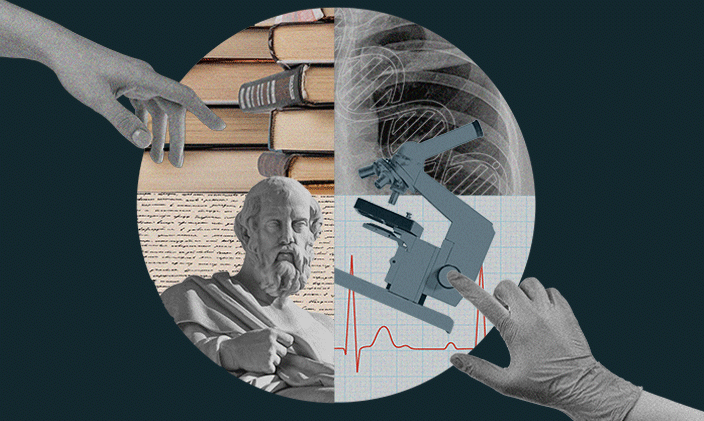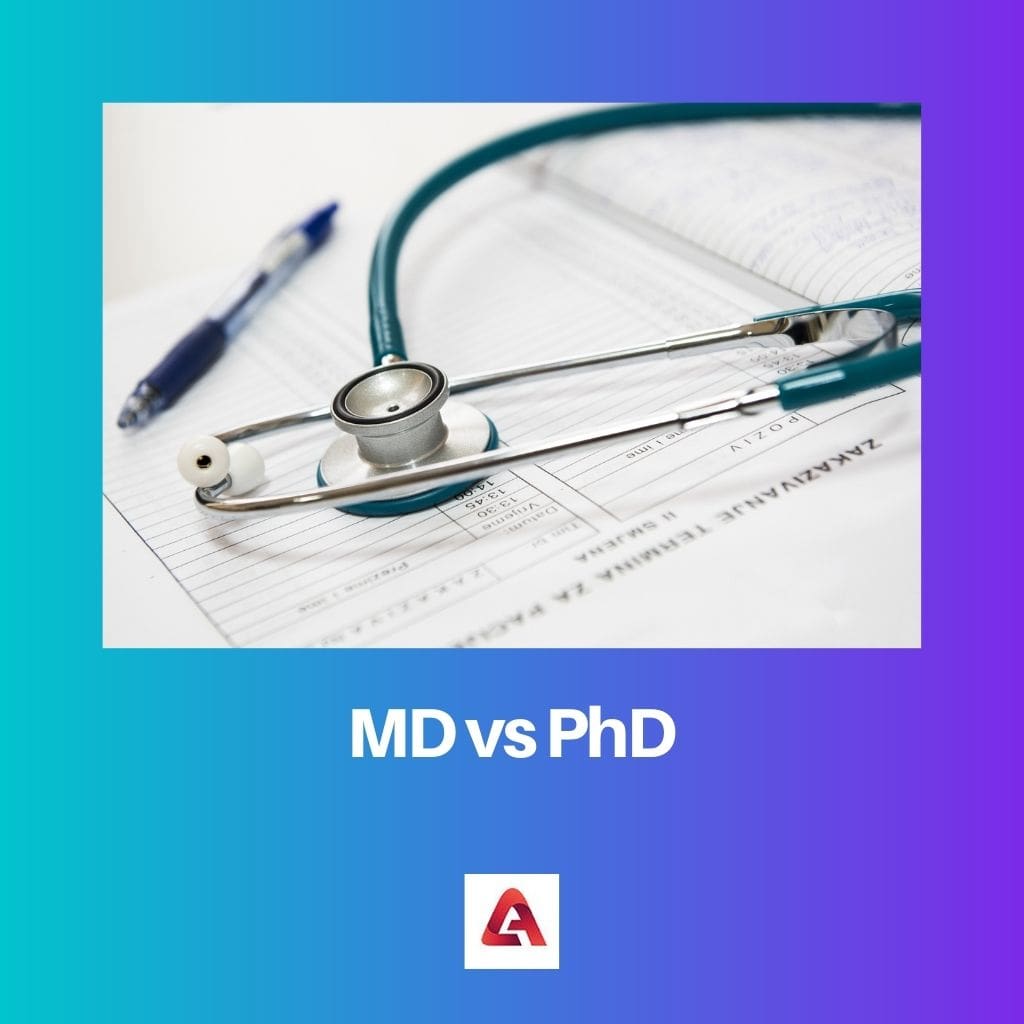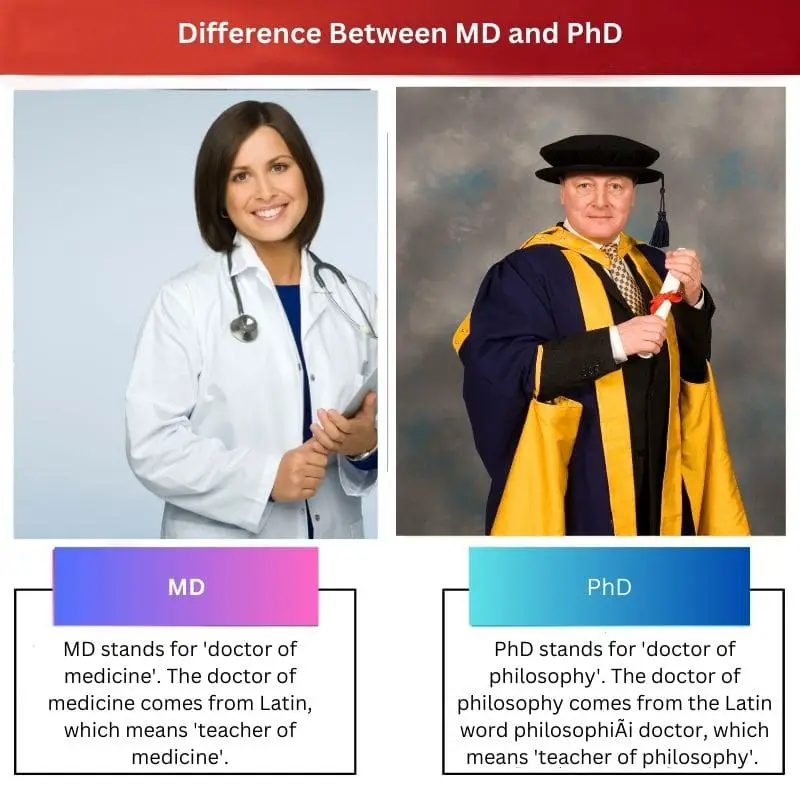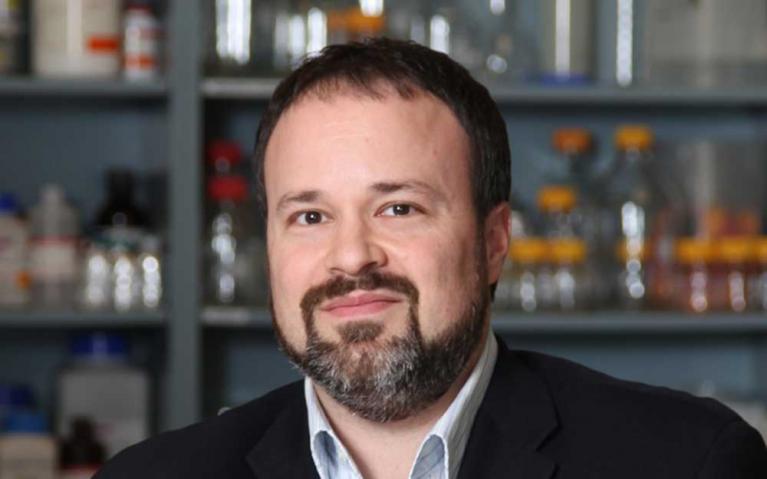
- PhD vs MD – Differences explained
- Types of Doctorates
A MD is a Doctor of Medicine, whilst a PhD is a Doctor of Philosophy. A MD program focuses on the application of medicine to diagnose and treat patients. A PhD program research focuses on research (in any field) to expand knowledge.

Introduction
This article will outline the key differences between a MD and a PhD. If you are unsure of which degree is suitable for you, then read on to find out the focuses and typical career paths of both. Please note this article has been written for the perspective of a US audience.
What is a MD?
MD (also seen stylized as M.D and M.D.) comes from the Latin term Medicīnae Doctor and denotes a Doctor of Medicine.
MDs practice allopathic medicine (they use modern medicine to treat symptoms and diseases). A common example would be your physician, though there are numerous types of medical doctors, with different areas of speciality and as such may be referred to differently.
What is a PhD?
A PhD (sometimes seen stylized as Ph.D.) comes from the Latin term Philosophiae Doctor and denotes a Doctor of Philosophy.
A PhD can be awarded for carrying out original research in any field, not just medicine. In comparison to an MD, a PhD in a Medicinal field is focused on finding out new knowledge, as opposed to applying current knowledge.
A PhD in Medicine therefore does not require you to attend medical school or complete a residency program. Instead, you are required to produce a thesis (which summarizes your research findings) and defend your work in an oral examination.
What is the difference between a MD and a PhD?
Both are Doctoral Degrees, and someone with either degree can be referred to as a doctor. But for clarity, MDs are awarded to those with expertise in practicing medicine and are therefore more likely to be found in clinical environments. PhDs are awarded to researchers, and are therefore more likely to be found in academic environments.
This does not mean that MDs cannot pursue a research career, nor does it mean that a PhD cannot pursue clinical practice. It does mean, however, that PhDs are more suited to those who would wish to pursue a career in research, and that MDs are more suited to those who prefer the clinical aspects of medicine or aspire to become a practicing physician.
It should also be noted that a medical PhD doctorates possess transferable skills which make them desirable to various employers. Their familiarity with the scientific method and research experience makes them well suited to industry work beyond medical research.
Program structure and time
The standard MD program structure sees students undertake 2 years of coursework and classroom-based learning, before undertaking 2 years of rotational work in a clinical environment (such as a hospital). Getting an MD requires attending a medical school (accredited by the Liaison Committee on Medical Education) and completing a residency program. Both of which prepare students to diagnose patients and practice clinical medicine.
The standard PhD program lasts 5 to 7 years and sees students undertake original research (monitored by a supervisor). Getting a PhD requires the contribution of novel findings, which leads to the advancement of knowledge within your field of research. With the exception of some clinical PhDs, a PhD alone is not enough to be able to prescribe medicine.
PhD doctorates are required to summarize the purpose, methodology, findings and significance of their research in a thesis. The final step is the ‘ Viva Voce ’ where the student must defend their thesis to a panel of examiners.
To summarize, a MD program usually lasts 4 years, whilst a PhD program lasts 5 to 7 years. Before being licensed to practice medicine, however, you must first complete a residency program which can last between 3 to 7 years.
What is a MD/PhD?
A MD/PhD is a dual doctoral degree. The program alternates between clinical focused learning and research focused work. This is ideal for those who are interested in both aspects of medicine. According to the Association of American Medical Colleges, an estimated 600 students matriculate into MD-PhD programs each year .
The typical length of a MD/PhD program is 7 to 8 years, almost twice the length of a MD alone. As with a MD, MD/PhDs are still required to attend medical school and must complete a residency program before being able to practice medicine.
In comparison to PhD and MD programs, MD/PhD positions in the United States are scarce and consequently more competitive. The tuition fees for MD/PhD positions are typically much lower than MD and PhD positions are sometimes waived completely.
Those who possess a MD/PhD are commonly referred to as medical scientists. The ability to combine their medical knowledge with research skills enables MD/PhDs to work in a wide range of positions from academia to industrial research.
Finding a PhD has never been this easy – search for a PhD by keyword, location or academic area of interest.
Browse PhDs Now
Join thousands of students.
Join thousands of other students and stay up to date with the latest PhD programmes, funding opportunities and advice.
- QUICK LINKS
- How to enroll
- Career services
Comparing the differences between MD vs. PhD vs. professional doctorate
By Michael Feder

This article has been vetted by University of Phoenix's editorial advisory committee. Read more about our editorial process.
Reviewed by Marc Booker, PhD, Vice Provost, Strategy
At a glance
- MD is the abbreviation for Doctor of Medicine and PhD stands for Doctor of Philosophy. These are two types of doctoral degrees in addition to professional doctorates.
- An MD is a doctoral degree for medical professionals, while a PhD is an academic degree focused on original research. Somewhat similar to a PhD are professional doctorates, which focus on applying practical research to problems in workplaces or communities.
- A professional or practice-based doctorate (EdD, DBA, etc.) can be medical, and others are for scholar-practitioners in disciplines like education, business or psychology.
- University of Phoenix does not offer MD or PhD programs, but students can earn a doctorate in business, nursing, education or healthcare that allows them to build upon their industry expertise. Learn more about the differences between these degree programs and if one of the five doctoral programs at University of Phoenix is right for you !
What is a doctorate? Breaking down the three types
Some people might confuse an MD (Doctor of Medicine) with a PhD (Doctor of Philosophy) , and vice versa. While both an MD and a PhD are prestigious degrees near the top of the academic ladder , they each have a different meaning and come with very different requirements .
Different still from both of those degrees are professional doctorates, which allow industry professionals to translate their education and experience into credibility and leadership through research. Professional doctorates have similar requirements to PhDs, such as a dissertation and residency, but focus on the application of research and professional growth over original research.
Upon graduation, those who have earned any of these three degrees can call themselves a “doctor,” but the path to a degree, the purpose behind it and its applications vary based on the choice. MD graduates want to work in medicine and healthcare. PhDs want to bring new knowledge and research to the world. A practice-based doctoral graduate wants to grow in their professional expertise. (If the last one sounds like you, University of Phoenix can help!)
Keep reading to learn more about these doctoral programs and which is right for you.
What does MD stand for?
MD is an abbreviation for Doctor of Medicine and identifies a medical practitioner who has completed undergraduate studies and four years of medical school. An MD program teaches medical students about the human body and diseases through a combination of classroom instruction and hands-on clinical labs.
Several types of physicians might have this degree, depending on their area of study. For example, medical practitioners with an MD degree might become a medical doctor and potentially specialize in dermatology, cardiovascular disease, family medicine, oncology, pediatrics, neurology or preventive medicine. As you can see, this degree can lead to a variety of career paths , depending on which specialty interests you and what your medical education is.
Learn more about online doctoral degrees at University of Phoenix.
How to earn an MD
Becoming a Doctor of Medicine requires a significant investment of time and money, but the reward can be well worth it. Before medical school, you’ll need to take the Medical College Admission Test (MCAT ® ) and earn a passing score. You’ll also need to build a portfolio of coursework and experience to help you gain admittance to medical school.
Medical school typically takes students four years to complete. You’ll learn the latest techniques and approaches for patient assessment, diagnosis and treatment. Medical schools commonly provide a combination of classroom, research and clinical experience . You’ll work alongside peers and healthcare professionals as you develop skills in general medicine.
You’ll choose a field to specialize in during your final year of medical school. Students have more than 120 options to choose from when specializing, including primary care, pediatrics, geriatrics, emergency medicine and family medicine .
After graduating, you’ll complete residency training to further develop skills in your specialty. Residency typically lasts three to seven years, depending on the field you’ve selected. During the residency portion of your education, you’ll treat patients under the supervision of more experienced physicians.
Even after you begin to practice as an MD, the educational portion of your career never stops . As practices change, patient needs evolve and research continues, MDs benefit from ongoing education to stay current.
What does PhD stand for?
A PhD, or Doctor of Philosophy , is a doctoral degree that recognizes graduates who have completed a full postsecondary program. Students can earn a PhD in more fields than philosophy. After completing the necessary coursework, original research and hands-on experience, you can earn a PhD in fields like science, the humanities and engineering.
Earning a PhD can help unlock a wide range of potential career opportunities. Computer engineers, research scientists, statisticians, healthcare administrators, professors, chemists and other careers commonly require a PhD degree, in addition to appropriate undergraduate study.
How to earn a PhD
Becoming a PhD is also a serious commitment that requires an investment of time, money and energy .
Here is what’s typically required to become a PhD:
- Complete a bachelor’s degree in your field
- Complete a master’s degree in an appropriate field
- Pass any program entrance exams
- Fulfill coursework, research and hands-on lab requirements in your program
- Finalize and defend your dissertation as a doctoral candidate (unless your program specifies otherwise)
It’s important to note that many PhD programs have different requirements , prerequisites and parameters for students. Check with your preferred institution for a more detailed explanation of these requirements.
What is a professional doctorate?
While some professional or practice-based doctorate programs are medical, others are designed for professionals in other fields . These programs are meant for scholar-practitioners in disciplines like education, business or psychology. One of the key differences between this degree and a PhD is the focus on applying research to a professional setting rather than conducting theoretical and research-focused studies. Often, programs are differentiated as academic versus professional.
Examples of doctoral degrees are Doctor of Education, Doctor of Nursing Practice and Doctor of Business Administration. Each of these programs focuses on a specific discipline and applying research in those areas to a professional setting.
How to earn a doctorate
While practitioner doctoral programs teach different skills, they all share common requirements. You’ll need to complete a bachelor’s degree in your field and sometimes a master’s degree, depending on program requirements.
After completing the necessary coursework and research, students also typically need to finish a supervised thesis and defend their dissertation or capstone project-specific coursework, research and hands-on labs alongside other students in the same field. However, this will depend on the specific program and its requirements.
What does the title “Dr.” really mean?
The term “doctor” or “Dr.” is commonly used today to describe a wide variety of occupations. Students who complete a doctoral degree can earn the title of “Dr.” even though they earned their credentials in a non-medical field like education or business management.
While a variety of professionals can earn a doctorate, the term is often still reserved for medical practitioners . In conventional use, doctors typically refer to medical physicians . However, it is appropriate to use “Dr.” if you graduated from any of the three programs discussed above.
read similar articles

What is doctoral candidacy?
Practitioner doctoral degree programs at university of phoenix.
While University of Phoenix (UOPX) does not have MD or PhD programs, it does offer several professional doctoral degrees that can be earned completely online. Students might choose the UOPX programs because classes are flexible and offered online, and because of the University’s unique “ Scholar-Practitioner-Leader model .”
If you are curious about a doctoral degree, the following programs are available at UOPX:
- Doctor of Business Administration — This doctorate can help you gain strategic vision and skills to position yourself as a business leader. It explores how to solve organizational problems, how to design and conduct research studies, how to introduce innovative business ideas to the industry and more.
- Doctor of Management — This doctorate equips you with critical thinking skills to find creative solutions to complex problems.
- Doctor of Education — This doctoral program prepares you to use analytical, critical and innovative thinking to improve performance and solve complex problems in education.
- Doctor of Health Administration — If you’re a health professional who is seeking greater responsibility in shaping the future of the health sector, this doctorate can help you meet the challenges inherent to today’s healthcare landscape, including economic fluctuations, burgeoning patient needs and industry-changing legislation.
- Doctor of Nursing Practice — This doctorate is designed for working nurses who require a doctorate for advanced practice or nurses who desire their terminal degree. It does not prepare students for professional certification or state licensure as a nurse or as an advanced practice nurse.
These doctoral studies are only some of the many options for professionals who want to gain the highest academic credentials in their fields. Doctoral programs offer significant benefits to program graduates, including newly developed skills , insight into field trends, hands-on research opportunities and leadership capabilities .
Completing a doctoral program is also a strong indication to employers that you’re serious about your career and your field. With so many options for advanced study, these programs are available for most major fields. Even if you have already completed a bachelor’s or master’s degree in your discipline, a doctorate lends further credibility to your reputation and can help prepare you for a leadership position .

ABOUT THE AUTHOR
Michael Feder is a content marketing specialist at University of Phoenix, where he researches and writes on a variety of topics, ranging from healthcare to IT. He is a graduate of the Johns Hopkins University Writing Seminars program and a New Jersey native!

want to read more like this?

List of Skills Needed for Nursing
Online degrees.
August 14, 2023 • 9 minutes

MD vs. PhD vs. Professional Doctorate Comparison
June 22, 2023 • 8 minutes

Careers With a Doctor of Education Degree
April 28, 2021 • 4 minute read
- Search All Scholarships
- Exclusive Scholarships
- Easy Scholarships to Apply For
- No Essay Scholarships
- Scholarships for HS Juniors
- Scholarships for HS Seniors
- Scholarships for College Students
- Scholarships for Grad Students
- Scholarships for Women
- Scholarships for Black Students
- Scholarships
- Student Loans
- College Admissions
- Financial Aid
- Scholarship Winners
- Scholarship Providers
Student-centric advice and objective recommendations
Higher education has never been more confusing or expensive. Our goal is to help you navigate the very big decisions related to higher ed with objective information and expert advice. Each piece of content on the site is original, based on extensive research, and reviewed by multiple editors, including a subject matter expert. This ensures that all of our content is up-to-date, useful, accurate, and thorough.
Our reviews and recommendations are based on extensive research, testing, and feedback. We may receive commission from links on our website, but that doesn’t affect our editors’ opinions. Our marketing partners don’t review, approve or endorse our editorial content. It’s accurate to the best of our knowledge when posted. You can find a complete list of our partners here .
M.D. vs. PhD. Degrees: What Are the Differences?

Cait Williams is a Content Writer at Scholarships360. Cait recently graduated from Ohio University with a degree in Journalism and Strategic Communications. During her time at OU, was active in the outdoor recreation community.
Learn about our editorial policies

Maria Geiger is Director of Content at Scholarships360. She is a former online educational technology instructor and adjunct writing instructor. In addition to education reform, Maria’s interests include viewpoint diversity, blended/flipped learning, digital communication, and integrating media/web tools into the curriculum to better facilitate student engagement. Maria earned both a B.A. and an M.A. in English Literature from Monmouth University, an M. Ed. in Education from Monmouth University, and a Virtual Online Teaching Certificate (VOLT) from the University of Pennsylvania.

Chances are, when you hear PhD and MD, you at least know that there is a difference between them. Since both are the titles of doctors, there’s still a lot of ambiguity as to what those specific differences are. In this article, we will look at how MDs and PhDs differ from one another and which one might be a better fit for you. Let’s jump in!
Doctor of Medicine (MD)
We’ll start by taking a separate look at MDs. An MD is a medical doctor. Their primary job is to work with patients in a variety of settings such as hospitals, clinics, and a variety of other places where having medical staff is necessary.
School
In order to become an MD, students must complete their undergraduate degree and then attend a four year medical school. Medical School is then followed by a residency, where a new doctor completes training under a senior physician. From start to finish, becoming a doctor takes around 8-12 years to finish undergrad, medical school, and residency.
Area of study
As a medical doctor, you will generally choose one area of medicine that you would like to focus on. Specialties can be based on a certain part of the body, such as cardiology, podiatry, or neurology. Aspiring medical doctors can also specialize in working with a select group of people, such as geriatrics or pediatrics, or finally, you can specialize in researching things like oncology. The possibilities are plentiful for MDs!
Where they work
Where you work will depend on what you choose to specialize in. Again, this could be in a hospital, a smaller clinic, or even across the globe with various organizations that work to provide medical care to underserved populations. Medical expertise is needed in many capacities, meaning that there is never a shortage of places that a medical degree could take you!
A word about DOs
Before we move on to PhDs, we have one more thing to clear up that you might have questions about. In addition to MDs, there is also another type of doctor called a DO, or a doctor of osteopathic medicine . DOs perform largely all the same functions as MDs, but with a more holistic approach. They attend undergrad just like MDs and then attend a four year DO program that is structured very similarly to a regular medical school.
The only difference between these two is where they receive their medical school training and how they approach studying medicine and treating patients. If you are thinking about becoming a medical doctor, you should take some time to explore DOs and what they do!
Doctorate of philosophy (PhD)
Okay, now onto PhDs! A doctorate of philosophy, known also as a PhD , doesn’t actually have anything to do with philosophy in most cases. A PhD can be completed in pretty much any field and is the highest level of education that one can receive.
In order to complete your PhD, you will need to first complete your undergrad, then a master’s program, and finally apply to PhD programs. Not all PhD programs require that you finish your masters. There are some schools that offer programs that allow you to complete both your masters and your doctorate at the same time.
Generally, schooling for your PhD takes anywhere from four to eight years to complete. The first year or two of your PhD is spent on coursework, while the remaining years are spent doing research and completing your dissertation.
There are endless areas of study that offer PhD programs. You can study everything from physical therapy, business management and psychology to health administration, engineering, social work, and so much more. The gist is pretty much that if you can think of a field of study, you can earn your PhD in it!
Based on the examples of fields you can study, it’s safe to say that what you study will determine where you decide to work. PhD holders are highly educated people, meaning that finding a job when you hold a PhD in your field will look pretty good to most employers.
Common places where you find a high concentration of PhDs are in hospitals, corporate offices, college campuses, and other educational institutions. Remember, though, that’s not a full list of where you could work–the list of places you could work is endless!
Tuition and Costs
It’s true, pursuing either one of these degrees is not the cheapest thing, but don’t let numbers scare you off! If anything in this article sounds like it is right for you, explore it thoroughly. There are lots of ways that you can pay for your education, including scholarships, organizations, and programs out there that want to help you do it!
Okay, so for some real talk, the price of either of these degrees can vary a lot. Medical school will generally cost between $45,000 – $65,000 a year, while PhD programs cost on average about $30,000 a year. But, again, this does not mean you have to be able to pay these costs out of pocket. There are a lot of programs for PhDs that work with you to help you pay for some of the costs. There are even some fully funded PhD programs !
Similarly, there are tons of medical scholarships and even tuition free medical schools that you can apply to help offset the costs of a medical degree. There are also options for student loans that you can take out as well. The point is, there are tons of ways to find your education. If a degree like this is right for you, it is possible to achieve with proper planning and determination.
Related: Top scholarships for graduate students
Shadowing
Before jumping all the way in with either of these degrees, shadowing is a great tool that can help you explore your intended field or job. It’s highly encouraged that students who want to attend medical school shadow at least a few different MDs and DOs prior to applying to medical school.
But the benefits of shadowing are not just for the medical world. You can ask to shadow just about anyone . Maybe you’d like to shadow a professor who you had during undergrad, a social worker, or someone you know of who works in business. There are no rules about who you can and can’t shadow, you simply have to ask and go from there!
What is right for you
Below are some basic questions to help you get your mind started thinking about whether an MD or PhD is right for you. The first set of questions pertains more to MD or DO degrees.
If you’re thinking about an MD or DO degree…
Questions to consider.
- Do you like working with people and helping them during difficult times?
- Do you love studying biological sciences ?
- Does working in a hospital or clinic sound like an environment you would enjoy?
If you’re thinking about a PhD…
- Is there a specific area or field you would like to study?
- Do you have a specific job in mind that you would like, and does it require a PhD?
The answers to these questions won’t instantly help you decide, but they should help you think a little deeper about these degrees.
Key Takeaways
- Both MDs and PhD holders are highly educated in their field of study, holding the highest degrees that you can earn
- The only way to become a practicing MD is to first obtain your bachelor’s degree, then attended a four year accredited medical school, and then successfully complete all the proper exams to practice medicine
- To earn a PhD, you do not have to attend medical school, but you will need to attend a PhD program, complete your undergrad, and usually complete your master’s degree before doing so
- There are lots of ways to fund both a PhD and an MD, including scholarships, grants, loans, and partially and fully funded programs for each
Frequently asked questions about the differences between MD and PhDs
Is a phd higher than an md, who gets paid more an md or a phd, is a phd harder than an md, scholarships360 recommended.

10 Tips for Successful College Applications

Coalition vs. Common App: What is the difference?

College Application Deadlines 2023-2024: What You Need to Know
Trending now.

How to Convert Your GPA to a 4.0 Scale

PSAT to SAT Score Conversion: Predict Your Score

What Are Public Ivy League Schools?
3 reasons to join scholarships360.
- Automatic entry to our $10,000 No-Essay Scholarship
- Personalized matching to thousands of vetted scholarships
- Quick apply for scholarships exclusive to our platform
By the way...Scholarships360 is 100% free!

What is the Real Difference between an MD and PhD?
Phds advance knowledge, whereas mds merely apply existing knowledge..
Posted March 7, 2011 | Reviewed by Kaja Perina
If you ask someone in the psychology world how people with PhDs (Doctor of Philosophy ) differ from those with MD (Doctor of Medicine) you may get an answer like "MDs can prescribe medication , whereas PhDs cannot." That is true. Another difference is that MDs generally make more money in the United States.
MDs are consider by many to be the "real doctors" because they can help with physiological medical problems. That too is true. I certainly don't refer to myself as "Dr. Kelly" in any context other than an academic setting, because people might get the false impression that I could jump in and help in the event of a broken foot or migraine headache.
All that sounds pretty bad for the PhD. But here's the most essential difference between the two degrees: PhDs advance knowledge, whereas MDs merely apply existing knowledge. Unlike the MD who does not need to produce any original research, the person earning a PhD must produce original research and write it up in a thesis or dissertation. Then a committee of experts must deem that thesis as offering an acceptable advancement of knowledge before the PhD is conferred. It typically takes a couple of years longer to earn a PhD than an MD. Part of the reason it takes so long is that the person earning the PhD is being trained on how to think critically about existing knowledge, and it can take a while to find one's niche and fill a gap in the knowledge base.
If you yourself want to make important scientific discoveries and then tell the world about them, you will be much better prepared by getting a PhD than an MD. You also will be much better prepared to criticize studies you read about in virtually any field because you will be trained in critical thinking and writing.
If you are deciding which degree is right for you, ask yourself if you will be content with applying the knowledge you learn (MD) from other people, or if you would like to get in on the action of making the discoveries yourself (PhD). For instance, would you like to be one of the scientists who are figuring out how to reverse the aging process (PhD)? Would you like to see if giving aging mice a particular the enzyme (one that you discover) makes their hair shiny again and restores their fertility (PhD)? Or would you be content giving your future medical patients the proper dose of the medications that arise from this research and then seeing the signs of youth return in your patients (MD)? These are the kinds of questions that college students everywhere should be asking themselves, and yet I have never seen them do so.
This difference in training also means that if you want to know what the cutting -edge knowledge is in a given field, you have to ask a PhD in that field, not an MD. So for instance, let's say you or your mate is having trouble getting pregnant . If you just ask your local obstetrician or gynecologist what the cutting edge discoveries are regarding fertility, that MD is not likely to know. That MD can give you fertility treatments that he or she has learned about and tried with other patients. It should be noted, however, that many MDs make an effort to remain abreast of scientific research long after their degree has been conferred.
The upshot of my message is this: We need both kinds of people, those who apply existing knowledge (such as the MD does in the medical field) and those who advance it (PhDs). But if you think a PhD is less qualified than an MD when it comes to having cutting-edge knowledge, you have that backwards.

Anita E. Kelly, Ph.D., is a Professor of Psychology at the University of Notre Dame. She is author of The Clever Student and The Psychology of Secrets.
- Find a Therapist
- Find a Treatment Center
- Find a Psychiatrist
- Find a Support Group
- Find Online Therapy
- United States
- Brooklyn, NY
- Chicago, IL
- Houston, TX
- Los Angeles, CA
- New York, NY
- Portland, OR
- San Diego, CA
- San Francisco, CA
- Seattle, WA
- Washington, DC
- Asperger's
- Bipolar Disorder
- Chronic Pain
- Eating Disorders
- Passive Aggression
- Personality
- Goal Setting
- Positive Psychology
- Stopping Smoking
- Low Sexual Desire
- Relationships
- Child Development
- Self Tests NEW
- Therapy Center
- Diagnosis Dictionary
- Types of Therapy

At any moment, someone’s aggravating behavior or our own bad luck can set us off on an emotional spiral that threatens to derail our entire day. Here’s how we can face our triggers with less reactivity so that we can get on with our lives.
- Emotional Intelligence
- Gaslighting
- Affective Forecasting
- Neuroscience
- Medical School
MD PhD vs MD: Which is best for you?

If you find yourself struggling between pursuing an MD PhD vs MD degree, you've come to the right place. In this blog, we'll explore the similarities and differences between medical doctors and physician-scientists to help you determine how to choose the pathway that is best suited for you.
>> Want us to help you get accepted? Schedule a free strategy call here . <<
Article Contents 7 min read
Md phd vs md: education.
While those with MD PhD and MD degrees are both medical doctors, MD PhD graduates also possess a PhD and are therefore known as physician-scientists or medical scientists. Obtaining this extra degree requires a different program structure and length compared to MD programs. MD PhD programs are generally 7-8 years in length and require attendance at both medical and graduate school. MD programs, on the other hand, will be completed in four years, half the time it will take MD PhD students. While both programs are classroom-based during the first two years, MD PhD students will move on to graduate school to complete their PhD thesis for between 3-4 years. They will then return to medical school for a year or two completing clinical rotations. Both MD PhD and MD graduates will complete their residency training for between 3-7 years before being licensed to practice medicine.
MD PhD vs MD: Application and Tuition
Whether you're interested in an MD PhD or an MD program, the application process is similar. You'll apply to most programs through AMCAS where you'll complete all sections of the application including the AMCAS work and activities section and you'll upload your coursework, letters of evaluation, and medical school personal statement . Make sure to find out if the schools of your choice require you to take CASPer test. If so, start practicing using CASPer sample questions as soon as you can. In addition to the standard application components, MD PhD applicants will have to complete two additional essays that describe both their reasons for pursuing an MD PhD degree and their research experience. Review our medical school application timelines blog to ensure you're aware of the application process and corresponding deadlines.
It's no secret that both MD PhD and MD programs are extremely competitive, with acceptance rates on average between 1-4%. There are far fewer MD PhD programs available compared with MD programs and the large benefit of reduced or waived tuition makes for even higher competition, especially in MSTPs vs MD programs. It's a good idea to use our medical school chance predictor to see how your grades and test scores compare with the average scores of accepted individuals into either program. Last year, MD PhD matriculants had an average MCAT score of 516 and an average GPA of 3.80 compared with the 511.5 MCAT score and 3.73 GPA of MD matriculants. So, we can see that in order to be a competitive MD PhD applicant, you'll have to possess a higher GPA and MCAT score than if you were to apply as an MD applicant. Of course, the level of competition varies between schools, and there are certainly MD programs that receive a high volume of applicants competing for few spots making some MD programs more competitive than MD-PhD programs, it's entirely dependant on the school, program, and application cycle.
MD PhD vs MD: Career Outlook and Salary
Although it may seem obvious that students who graduate from MD programs become medical doctors and most practice medicine at hospitals, clinics, medical centers, and private practices, some students are unsure of what a career looks like as a physician-scientist. Many MD PhD graduates choose to complete their residency training in internal medicine, pathology, pediatrics, and neurology, however, many other specialties are also represented, from surgery to radiology to emergency medicine. Internal medicine is also a common specialty choice for MD graduates as well as pediatrics, emergency medicine, and family medicine. According to a study conducted by the AAMC, nearly 80% of all MD PhD graduates enjoy careers as faculty members at medical schools or work for the National Institute of Health (NIH), other research institutions, industry, and federal agencies with many devoting a large portion of their time to research. Also, out of roughly 7000 MD-PhD alumni that took part in this study, 82% said that they would partake in MD-PhD training again, even if they had the chance to go back in time and change their mind.
Physician-scientists not only possess in-depth knowledge in the medical field, they also have knowledge of population health and disease and will be trained to conduct independent research and analysis. With this dual degree, physician-scientists are highly valued for their ability to treat patients while also contributing to detecting health threats, developing new treatments, therapies or even cures. Physician-scientists working in academia can teach and provide clinical service, while also conducting their own, or joint, research. The annual salary for physician-scientists is usually between $60,000-$115,000, depending on the type and place of employment.
Physicians manage and support the health and well-being of those in their care. Through physical examinations, diagnostic testing, treatment, and communication, they can manage and significantly improve the health of their patients. Depending on the type of physician, they may perform surgeries and treat either general or specific illness and disease. Annual salaries generally correspond to level of training and specialization and usually range from $180,000-$280,000
For some, from the moment they put on safety glasses in science class or that time they resuscitate their childhood teddy bear, they knew what they were going to be when they grew up. Not everyone has an immediate passion or the typical “aha” moment later on in life. Sometimes, a student's drive to medicine or research develops later on in life, through experiences, education or even while overcoming hardships, and this is perfectly normal. So, what if you have a passion for both science and medicine? How can you choose whether to pursue an MD degree or a joint MD PhD degree? It's important to choose only once you've considered a variety of factors and are 100% sure in your decision, because the reality is, neither option will be easy and you'll have to be willing to invest the time, money, and effort to be successful.
Find out what drives you.
Start by thinking about what you're interested in and what motivates you to help you determine where your true passions lie. If you know that you are really interested in medicine and in helping others but only have a slight interest in research, then it's probably a good idea to pursue medicine on its own. At nearly twice the length of an MD program, the MD PhD program is no walk in the park. Students should only pursue this joint degree if they have a serious passion for both medicine and research. In addition to feeling passionate about treating patients, if you find yourself interested in the mechanisms behind disease, are curious about the unknowns and can't picture a career that doesn't involve research, it's a good sign that the joint program will be suitable for you.
Determining whether or not you are interested in becoming a medical doctor or a physician-scientist is the first and most important decision you'll have to make when deciding between the two pathways. If you're motivated by your passions, you're likely to enjoy your career because it's actually what you want to do. By putting in the time and effort to be the best version of yourself, you'll have a fulfilling rewarding career.
So, how can you know for sure which path is the best for you? Gain experience in the field well in advance of filling out your applications. This will be closest you'll get to test drive your potential career choice. If you're struggling to decide between an MD and MD PhD program, be sure to gain both clinical and research experience. This will be a great way for you to get hands-on experience in both fields to see which areas really spark your interest and which areas you're not as keen on. Learn how to ask to shadow a doctor , sign up for volunteering experiences that place you in the medical or research field, and partake in scientific experiments where you'll be testing hypotheses to gain research experience. Not only will these experiences be essential when filling out your medical school applications, the key is that through a variety of different experiences, you'll be able to hone in on your interests.
Consider the affordability of each program.
According to the AAMC, approximately 76% of medical school students graduate with debt. For the students that borrow money, the median debt is approximately $200,000 at public medical schools. Of course, with an average physician salary of $300,000, this debt can be repaid, but it can be a rocky start for students as they begin entering their careers. A major benefit of MD PhD programs is the fact that most programs partially cover or completely waive tuition for enrolled students, and many also provide a stipend that can be used to cover the costs of living expenses. Due to this, some students can finish their training debt-free, and potentially even with a decent amount of savings. Now, this isn't to say that you should simply pick a program based on the cost but it's an important factor to consider if you want to pursue either option. What's important is that you pick your path depending on which best aligns with your interests, motivations, and short and long term career goals.
Check out this video for a recap:
Like our blog? Write for us ! >>
Have a question ask our admissions experts below and we'll answer your questions, get started now.
Talk to one of our admissions experts
Our site uses cookies. By using our website, you agree with our cookie policy .
FREE Training Webinar: How To Make Your Med School Application Stand Out
(and avoid the top 5 reasons that get 90% of applicants rejected).
Time Sensitive. Limited Spots Available:
We guarantee your acceptance to med school or you don't pay.
Swipe up to see a great offer!
Explore Jobs
- Jobs Near Me
- Remote Jobs
- Full Time Jobs
- Part Time Jobs
- Entry Level Jobs
- Work From Home Jobs
Find Specific Jobs
- $15 Per Hour Jobs
- $20 Per Hour Jobs
- Hiring Immediately Jobs
- High School Jobs
- H1b Visa Jobs
Explore Careers
- Business And Financial
- Architecture And Engineering
- Computer And Mathematical
Explore Professions
- What They Do
- Certifications
- Demographics
Best Companies
- Health Care
- Fortune 500
Explore Companies
- CEO And Executies
- Resume Builder
- Career Advice
- Explore Majors
- Questions And Answers
- Interview Questions
Ph.D. Vs. MD: What’s The Difference?
- Undergraduate vs. Graduate
- Weighted vs. Unweighted GPA
- APR vs. APY
- Dual Degree vs. Double Major
- Master's vs. Phd
- Private vs. Public College
- CAPM vs. PMP
- High School Diploma vs. GED
Find a Job You Really Want In
For individuals looking to pursue a doctorate, most are faced with the decision between PhDs ( Doctor of Philosophy) or MDs (Doctor of Medicine) degrees. These two may seem similar in nature, but there are key differences it’s important to understand before you pursue either one. Depending on your professional goals, one may suit you better than the other.
Both PhDs and MDs represent the highest level of graduate school one can receive. They are prestigious degrees in both regards but can significantly impact your career path once you’re finished with school. In this article, we’ll discuss what each degree is, the differences between them, and which one may be best for the types of goals an individual seeks.
Key Takeaways:
What Is an MD?
MD stands for Doctor of Medicine, meaning those who achieve this level of education are allopathic doctors. This means they are individuals who are licensed to treat and diagnose conditions using tools like x-rays, prescription drugs, and surgery. They can work as broader practitioners or work with a specific specialty.
Pursuing an MD means individuals are pursuing a traditional medical degree where they undergo practical training as they work through graduate school in the hopes of becoming licensed physicians by the time they graduate. Depending on their fields of specialty, their training may vary. Some of these specialties include
Surgery. Surgeons are doctors who specialize in evaluating and treating conditions that require physical changes to the human body. Surgeons use instruments to move live tissues in order to treat a specific ailment or illness. They can perform both open surgery and minimally invasive surgery.
Specific body parts or organs. MDs can also specialize in body parts or organs, becoming a cardiologist who is an expert on the heart, gastroenterologists who specialize in digestive organs, hematologists who specialize in blood, or neurologists who specialize in the nervous system, including the brain, spinal cord, and nerves.
Psychiatry. Psychiatrists are MDs who specialize in mental health, which can include substance use disorders. They are licensed and qualified to assess the mental and physical aspects of psychological problems as well as administer certain prescription drugs to help with these issues.
Geriatric medicine. MDs in geriatrics have additional specialized training in treating the ailments and illnesses of older patients. They often work in outpatient settings, nursing facilities, or hospitals. They often have added knowledge of diseases such as dementia, incontinence, or osteoporosis.
Pediatrics. Pediatricians are MDs who focus on the health of infants, children, adolescents, and young adults, typically up to age 21. These doctors prevent, detect, and manage any physical, behavioral, or developmental issues that may arise in children or young adults.
In order to become an MD, students must attend graduate school with the specific goal of becoming a physician . It’s during this time most choose a specialty and gain specific experience in that area. Because MDs have expertise in practicing medicine, they are more likely to be found in clinical environments.
A standard program for an MD requires students to take two years of coursework in a classroom-based setting. Then, they’ll be required to take two years of rotational work in a clinical environment. They must attend an accredited medical school as well as a residency program that prepares them to diagnose patients and practice medicine.
What Is a Ph.D.?
A Ph.D. or Doctor of Philosophy is a doctoral research degree that requires the completion of intensive research in order to become an expert in a specific field. To receive this type of degree, a Ph.D. must defend a dissertation or a research document. Unlike an MD, a Ph.D. can be awarded for carrying out original research in any field, not just medicine.
A Ph.D. in a medicinal field is focused on finding out new knowledge as opposed to learning current knowledge, like an MD. That means if you pursue a Ph.D. in medicine, you are not required to attend medical school or complete a residency program. Your dissertation and defense of that dissertation are what complete your program.
Ph.D. programs focus almost entirely on conducting, compiling, and contributing to specific research. The standard Ph.D. program lasts anywhere from five to seven years and seeks students undertaking original research that is typically monitored by a supervisor . Achieving a Ph.D. means the student has contributed to novel findings leading to advancement in knowledge.
There is such a wide variety of Ph.D. fields, but it would be impossible to list them all here; however, it’s important to note that most Ph.D. students continue their studies in their field long after graduation is behind them. Typically they will continue their research and participate in other programs that allow for further research.
Individuals working towards a Ph.D. often choose to work in academia, such as at a college or university, where they can continue their research. Others may opt to work for independent companies such as pharmaceutical or engineering companies. Others may use their Ph.D. in fields unrelated to research, such as senior positions in their field of study.
Ph.D. vs. MD FAQ
Is an MD or Ph.D. better?
Depending on your professional goals, an MD degree is better for those interested in practicing medicine, while a Ph.D. is better for individuals looking to advance knowledge in certain fields.
Does an MD or Ph.D. make more money?
This typically depends on the specific specialty or setting, but MDs typically earn more money than those with a Ph.D.
Can an MD research without obtaining a Ph.D.?
Yes, an MD does not need a Ph.D. to conduct research.
How useful was this post?
Click on a star to rate it!
Average rating / 5. Vote count:
No votes so far! Be the first to rate this post.

Caitlin Mazur is a freelance writer at Zippia. Caitlin is passionate about helping Zippia’s readers land the jobs of their dreams by offering content that discusses job-seeking advice based on experience and extensive research. Caitlin holds a degree in English from Saint Joseph’s University in Philadelphia, PA.
Recent Job Searches
- Registered Nurse Jobs Resume Location
- Truck Driver Jobs Resume Location
- Call Center Representative Jobs Resume Location
- Customer Service Representative Jobs Resume
- Delivery Driver Jobs Resume Location
- Warehouse Worker Jobs Resume Location
- Account Executive Jobs Resume Location
- Sales Associate Jobs Resume Location
- Licensed Practical Nurse Jobs Resume Location
- Company Driver Jobs Resume
Related posts

Histogram Vs. Bar Graph: What’s The Difference?

W-2 Vs. W-4 Tax Forms: What’s The Difference?

How To Find A Job After College (With Tips)

Product Manager Vs. Project Manager: What’s The Difference?
- Career Advice >
- Education >
- Program Finder
- Admissions Services
- Course Directory
- Academic Calendar
- Hybrid Campus
- Lecture Series
- Convocation
- Strategy and Development
- Implementation and Impact
- Integrity and Oversight
- In the School
- In the Field
- In Baltimore
- Resources for Practitioners
- Articles & News Releases
- In The News
- Statements & Announcements
- At a Glance
- Student Life
- Strategic Priorities
- Inclusion, Diversity, Anti-Racism, and Equity (IDARE)
- What is Public Health?
- Doctor of Medicine and Doctor of Philosophy (MD/PhD)
- MAS Application Fee Waiver Requirements
- Master of Arts (MA) in Geography and Environmental Engineering
- Master of Arts and Master of Science in Public Health (MA/MSPH)
- Master of Arts in Public Health Biology (MAPHB)
- Master of Bioethics (MBE)
- Mission, Vision, and Values
- Student Experience
- Program Outcomes
- For Hopkins Undergraduate Students
- Master of Health Science (MHS) - Department of Biochemistry and Molecular Biology
- Master of Health Science (MHS) - Department of Epidemiology
- Alumni Update
- MHS Combined with a Certificate Program
- Master of Health Science (MHS) - Department of Molecular Microbiology and Immunology
- Alumni Highlights
- Post-Baccalaureate Program in Environmental Health for Pre-Medicine Students
- Bachelor's/MHS in Health Economics and Outcomes Research
- MHS HEOR Careers
- Frequently Asked Questions
- Master of Health Science (MHS)
- Concurrent School-Wide Master of Health Science Program in Biostatistics
- Master of Health Science - Department of Population, Family and Reproductive Health
- Master of Health Science Online (MHS) - Department of Population, Family and Reproductive Health
- Careers in Health Economics
- Core Competencies
- Meet the Director
- What is Health Economics
- MPH Capstone Schedule
- Concentrations
- Online/Part-Time Format
- Requirements
- Tuition and Funding
- Executive Board Faculty
- Master of Science (MS) in Geography and Environmental Engineering
- Independent Professional Project and Final Essay
- Program Objectives and Outcomes
- Internships
- Master of Science (ScM) - Department of Biochemistry and Molecular Biology
- Master of Science (ScM) - Department of Biostatistics
- Master of Science (ScM) - Department of Epidemiology
- Master of Science (ScM) - Department of Molecular Microbiology and Immunology
- ScM Faculty Advisers
- Master of Science in Engineering (MSE) in Geography and Environmental Engineering
- Bachelor's/MSPH in Health Policy
- FAQ for MSPH in Health Policy
- Field Placement Experience
- MSPH Capstone
- MSPH Practicum
- Required and Elective Courses
- Student Timeline
- Career Opportunities
- 38-Week Dietetics Practicum
- Completion Requirements
- MSPH/RD Program FAQ
- Program Goals
- Master's Essay Titles
- Application Fee Waiver Requirements
- Doctor of Philosophy (PhD) - Department of Biostatistics
- Doctor of Philosophy (PhD) - Department of Epidemiology
- Program Goals and Expectations
- Doctor of Philosophy (PhD) - Department of Molecular Microbiology and Immunology
- Doctor of Philosophy (PhD) - Department of Population, Family and Reproductive Health
- Doctor of Philosophy (PhD) in Clinical Investigation
- Track in Environmental Sustainability, Resilience, and Health
- Track in Exposure Sciences and Environmental Epidemiology
- Track in Health Security
- Track in Toxicology, Physiology and Molecular Mechanisms
- PhD in Geography and Environmental Engineering Faculty Advisers
- Recent Graduates and Dissertation Titles
- PhD Funding
- PhD TA Requirement
- Recent Dissertation Titles
- JHU-Tsinghua Doctor of Public Health
- Core Course Requirements
- Concentration in Women’s and Reproductive Health
- Custom Track
- Concentration in Environmental Health
- Concentration in Global Health: Policy and Evaluation
- Concentration in Health Equity and Social Justice
- Concentration in Health Policy and Management
- Concentration in Implementation Science
- Meet Current Students
- Combined Bachelor's / Master's Programs
- Concurrent MHS Option for BSPH Doctoral Students
- Concurrent MSPH Option for JHSPH Doctoral students
- Adolescent Health Certificate Program
- Bioethics Certificate Program
- Climate and Health Certificate Program
- Clinical Trials Certificate Program
- Community- Based Public Health Certificate Program
- Demographic Methods Certificate Program
- Environmental and Occupational Health Certificate Program
- Epidemiology for Public Health Professionals Certificate Program
- Evaluation: International Health Programs Certificate Program
- Food Systems, the Environment and Public Health Certificate Program
- Frequently Asked Questions for Certificate Programs
- Gender and Health Certificate Program
- Gerontology Certificate Program
- Global Digital Health Certificate Program
- Global Health Certificate Program
- Global Health Practice Certificate Program
- Health Communication Certificate Program
- Health Disparities and Health Inequality Certificate Program
- Health Education Certificate Program
- Health Finance and Management Certificate Program
- Health and Human Rights Certificate Program
- Healthcare Epidemiology and Infection Prevention and Control Certificate Program
- Humane Sciences and Toxicology Policy Certificate Program
- Humanitarian Health Certificate Program
- Implementation Science and Research Practice Certificate Program
- Injury and Violence Prevention Certificate Program
- International Healthcare Management and Leadership Certificate Program
- Leadership for Public Health and Healthcare Certificate Program
- Lesbian, Gay, Bisexual, Transgender, and Queer (LGBTQ) Public Health Certificate Program
- Maternal and Child Health Certificate Program
- Mental Health Policy, Economics and Services Certificate Program
- Non-Degree Students General Admissions Info
- Pharmacoepidemiology and Drug Safety Certificate Program
- Population Health Management Certificate Program
- Population and Health Certificate Program
- Product Stewardship for Sustainability Certificate Program
- Public Health Advocacy Certificate Program
- Public Health Economics Certificate Program
- Public Health Informatics Certificate Program
- Public Health Practice Certificate Program
- Declaration of Intent - Public Health Preparedness
- Public Health Training Certificate for American Indian Health Professionals
- Public Mental Health Research Certificate Program
- Quality, Patient Safety and Outcomes Research Certificate Program
- Quantitative Methods in Public Health Certificate Program
- Requirements for Successful Completion of a Certificate Program
- Rigor, Reproducibility, and Responsibility in Scientific Practice Certificate Program
- Risk Sciences and Public Policy Certificate Program
- Spatial Analysis for Public Health Certificate Program
- Training Certificate in Public Health
- Tropical Medicine Certificate Program
- Tuition for Certificate Programs
- Vaccine Science and Policy Certificate Program
- Online Student Experience
- Online Programs for Applied Learning
- Barcelona Information
- Fall Institute Housing Accommodations
- Participating Centers
- Registration, Tuition, and Fees
- Agency Scholarship Application
- General Scholarship Application
- UPF Scholarship Application
- Course Evaluations
- Online Courses
- Registration
- General Institute Tuition Information
- International Students
- Directions to the Bloomberg School
- All Courses
- Important Guidance for ONSITE Students
- D.C. Courses
- Registration and Fees
- Cancellation and Closure Policies
- Application Procedures
- Career Search
- Current Activities
- Current Trainees
- Related Links
- Process for Appointing Postdoctoral Fellows
- Message from the Director
- Program Details
- Admissions FAQ
- Current Residents
- Elective Opportunities for Visiting Trainees
- What is Occupational and Environmental Medicine?
- Admissions Info
- Graduates by Year
- Compensation and Benefits
- How to Apply
- Academic Committee
- Course Details and Registration
- Tuition and Fees
- ONLINE SOCI PROGRAM
- Principal Faculty
- Johns Hopkins RAPID Psychological First Aid
- General Application
- JHHS Application
- Areas of Study
- Important Dates
- Our Faculty
- Welcome Letter
- Descripción los Cursos
- Programa en Epidemiología para Gestores de Salud, Basado en Internet
- Consultants
- Britt Dahlberg, PhD
- Joke Bradt, PhD, MT-BC
- Mark R. Luborsky, PhD
- Marsha Wittink, PhD
- Rebekka Lee, ScD
- Su Yeon Lee-Tauler, PhD
- Theresa Hoeft, PhD
- Vicki L. Plano Clark, PhD
- Program Retreat
- Mixed Methods Applications: Illustrations
- Announcements
- 2023 Call for Applications
- Jennifer I Manuel, PhD, MSW
- Joke Bradt, PhD
- Josiemer Mattei, PhD, MPH
- Justin Sanders, MD, MSc
- Linda Charmaran, PhD
- Nao Hagiwara, PhD
- Nynikka R. A. Palmer, DrPH, MPH
- Olayinka O. Shiyanbola, BPharm, PhD
- Sarah Ronis, MD, MPH
- Susan D. Brown, PhD
- Tara Lagu, MD, MPH
- Theresa Hoft, PhD
- Wynne E. Norton, PhD
- Yvonne Mensa-Wilmot, PhD, MPH
- A. Susana Ramírez, PhD, MPH
- Animesh Sabnis, MD, MSHS
- Autumn Kieber-Emmons, MD, MPH
- Benjamin Han, MD, MPH
- Brooke A. Levandowski, PhD, MPA
- Camille R. Quinn, PhD, AM, LCSW
- Justine Wu, MD, MPH
- Kelly Aschbrenner, PhD
- Kim N. Danforth, ScD, MPH
- Loreto Leiva, PhD
- Marie Brault, PhD
- Mary E. Cooley, PhD, RN, FAAN
- Meganne K. Masko, PhD, MT-BC/L
- PhuongThao D. Le, PhD, MPH
- Rebecca Lobb, ScD, MPH
- Allegra R. Gordon, ScD MPH
- Anita Misra-Hebert, MD MPH FACP
- Arden M. Morris, MD, MPH
- Caroline Silva, PhD
- Danielle Davidov, PhD
- Hans Oh, PhD
- J. Nicholas Dionne-Odom, PhD RN ACHPN
- Jacqueline Mogle, PhD
- Jammie Hopkins, DrPH, MS
- Joe Glass, PhD MSW
- Karen Whiteman, PhD MSW
- Katie Schultz, PhD MSW
- Rose Molina, MD
- Uriyoán Colón-Ramos, ScD MPA
- Andrew Riley, PhD
- Byron J. Powell, PhD, LCSW
- Carrie Nieman MD, MPH
- Charles R. Rogers, PhD, MPH, MS, CHES®
- Emily E. Haroz, PhD
- Jennifer Tsui, Ph.D., M.P.H.
- Jessica Magidson, PhD
- Katherine Sanchez, PhD, LCSW
- Kelly Doran, MD, MHS
- Kiara Alvarez, PhD
- LaPrincess C. Brewer, MD, MPH
- Melissa Radey, PhD, MA, MSSW
- Sophia L. Johnson, PharmD, MPH, PhD
- Supriya Gupta Mohile, MD, MS
- Virginia McKay, PhD
- Andrew Cohen, MD, PhD
- Angela Chen, PhD, PMHNP-BC, RN
- Christopher Salas-Wright, PhD, MSW
- Eliza Park MD, MS
- Jaime M. Hughes, PhD, MPH, MSW
- Johanne Eliacin, PhD, HSPP
- Lingrui Liu ScD MS
- Meaghan Kennedy, MD
- Nicole Stadnick, PhD, MPH
- Paula Aristizabal, MD
- Radhika Sundararajan, MD
- Sara Mamo, AuD, PhD
- Tullika Garg, MD MPH FACS
- Allison Magnuson, DO
- Ariel Williamson PhD, DBSM
- Benita Bamgbade, PharmD, PhD
- Christopher Woodrell MD
- Hung-Jui (Ray) Tan, MD, MSHPM
- Jasmine Abrams, PhD
- Jose Alejandro Rauh-Hain, MD
- Karen Flórez, DrPH, MPH
- Lavanya Vasudevan, PhD, MPH, CPH
- Maria Garcia, MD, MPH
- Robert Brady, PhD
- Saria Hassan, MD
- Scherezade Mama, DrPH
- Yuan Lu, ScD
- 2021 Scholars
- Sign Up for Our Email List
- Workforce Training
- Cells-to-Society Courses
- Course/Section Numbers Explained
- Pathway Program with Goucher College
- The George G. Graham Lecture
In partnership with the Johns Hopkins School of Medicine , the Bloomberg School offers students the opportunity to earn a Doctor of Medicine (MD) alongside a Doctor of Philosophy (PhD) – a rigorous combination that prepares graduates for prestigious careers in academic medicine.
The long-lasting relationship between the School of Medicine and the Bloomberg School – both situated along the same city block here in Baltimore – fosters the ideal environment for this combined six or eight year program.
Students complete two years of medical school before devoting themselves full-time to their PhD studies. After completion of the PhD degree requirements, students then complete their MD degree.
Interested “physician-scientists” should contact the MD/PhD program administrator, Sharon Welling ( [email protected] or 410-955-8008), and visit the MD/PhD Program's website for full details on admission requirements and application procedures.
Doctorate vs. PhD: Understanding the Key Differences [2024]
If you’re interested in pursuing a doctoral degree, you may wonder about the differences between a doctorate vs. PhD.

A doctorate and a PhD are both terminal degrees that allow you to develop specialized knowledge and skills in your chosen field. But these degrees typically have different areas of focus, requirements, and career outcomes.
Editorial Listing ShortCode:
Understanding the difference between PhD and doctorate can help you pick the degree that most aligns with your career aspirations and interests.
What’s the Difference Between Doctorate vs. PhD Degrees?

A doctorate and a Ph.D. are the highest college degrees students can earn. Graduates of both types of programs receive the title of “doctor” and may qualify for specialized careers in their fields.
But, while doctorate programs focus on professional competencies and knowledge, PhD programs prioritize academic research.
What Is a Doctorate Degree?

A doctorate degree is a professional degree that enables students to become experts in a specific field or industry. This degree focuses on applying academic research and theories in the workplace to improve performance and solve problems.
Courses vary by field and program but typically emphasize professional skills like collaboration, leadership, and project management. Additionally, many doctorate programs require students to complete a capstone project that addresses real issues affecting their industry.
Graduates often qualify for advanced administrative, leadership, and managerial positions in their fields.
What Is a PhD Degree?

A Doctor of Philosophy (PhD) degree is an opportunity to strengthen your academic research skills and generate original knowledge. This degree trains students to become independent scholars who conduct cutting-edge research in their areas of expertise.
PhD curriculums cover advanced concepts and theories in a discipline. They also teach students qualitative and quantitative methodologies to design studies and conduct research. Additionally, most PhD programs require students to produce a dissertation that contributes fresh knowledge to the field.
Current professionals with PhDs often work as academic researchers and professors. They may also secure government and industry jobs.
Key Differences Between a PhD vs. Doctorate Degree
What’s a PhD degree ? What’s a doctorate degree? The main difference between a doctorate and a PhD is their area of focus. A doctorate prioritizes applied knowledge and professional skills, while a PhD emphasizes academic research. Let’s compare some more differences between a professional doctoral degree vs. PhD.

A doctorate enables students to become expert practitioners in their discipline. Students study existing concepts and theories and learn how to apply these ideas in the workplace.
By contrast, a PhD prepares students to conduct innovative research and educate others.
Goals and Outcomes

Doctorate programs help prepare students for senior administrative and leadership positions in their industries. They also help students enhance their professional competencies and tackle industry-specific challenges.
Students who pursue PhDs aim to advance their disciplines by generating new knowledge. They may also publish peer-reviewed research and teach undergraduate courses.
Student Population

Doctorate degrees are designed for current or aspiring working professionals who want to become industry leaders. These programs also enable students to increase their knowledge and credibility.
PhD programs attract students who want to expand their knowledge of research methodologies and theories. These learners also frequently pursue academic careers.
Admissions Requirements

Doctorate and PhD programs typically require students to have bachelor’s and master’s degrees.
Additionally, prospective doctorate students may be asked to provide evidence of work experience, while PhD students might demonstrate their research abilities with a writing sample.
Program Length

Requirements vary by program, but full-time students typically complete a doctorate in 3 to 5 years. Programs that require a capstone project may take longer. For those considering quick degrees, a number of universities now offer accelerated doctoral programs online .
PhD programs often take 4 to 7 years to finish. The speed at which students research and write their dissertations can significantly impact the timeline.

The curriculum for doctorate programs typically centers on practical skills and contemporary issues in the field. Topics may include communication, ethics, and leadership.
PhD programs offer classes on research methods, theories, and disciplinary trends. Students also learn how to write journal articles and present at conferences.
Assessment and Completion Requirements

Doctorate and PhD students both complete 2 or more years of coursework. They also demonstrate their knowledge during comprehensive exams.
Doctorate students may produce a capstone project that applies their knowledge to real problems. By contrast, PhD students write dissertations based on original research.
If You Have a PhD, Are You a Doctor?

Is a PhD a doctor ? While graduates who earn a PhD are referred to as doctors, a PhD is different from a Doctor of Medicine (MD).
Doctors with MDs are medical doctors who can legally prescribe medications, perform surgery, and treat patients. They typically apply existing medical knowledge instead of conducting research. Doctors with PhDs don’t have any of these abilities. Instead, they have specialized knowledge and perform academic research in a particular field.
PhD or Doctorate Degree – Which Is Right for You?

Understanding the difference between a doctorate and a PhD can help you select the right degree for you.
Professional doctorate degrees help students become leading practitioners and problem solvers. By contrast, PhD degrees enable students to hone their research skills and learn advanced concepts. Both degrees allow you to enrich your understanding of your chosen discipline or profession. They also help you boost your credentials and develop new skills.
After you decide between a doctorate degree vs. PhD, you can explore program options from accredited schools to find the best fit.

“M.D.” vs. “Ph.D.” vs. “Dr.”: Are They Synonyms?
Quick: when you hear the word doctor , what do you picture?
Most would probably describe someone in a white lab coat with a stethoscope hanging around their neck or someone in medical scrubs—someone you would seek out if you have a deep cut that needed stitches.
That word doctor , however, is a title assigned to many who don’t come close to that description, many of whom you wouldn’t want stitching up that cut. Take your English professor, for instance. No offense, Dr. Barrett.
It can all be a bit confusing, which is why it’s important to know who and why someone might be called a doctor , as well as what all those initials and abbreviations after their name mean. Here we break it all down.
What does Dr. mean?
Let’s start with doctor or D r . for short. While the first definition of the word is “ a person licensed to practice medicine,” that doesn’t mean you want to take medical advice from anyone who calls themselves a doctor . There are many looser definitions of the word that follow and, frankly, make things a bit confusing.
For example, the third definition is older slang for a “cook, as at a camp or on a ship,” while the seventh entry is “an eminent scholar and teacher.” Bugs Bunny didn’t help matters either by plying anyone and everyone with his famous greeting,“What’s up, doc?”
The term doctor can be traced back to the late 1200s, and it stems from a Latin word meaning “to teach.” It wasn’t used to describe a licensed medical practitioner until about 1400, and it wasn’t used as such with regularity until the late 1600s. It replaced the former word used for medical doctors— leech , which is now considered archaic.
WATCH: When Did The Word "Doctor" Become Medical?
Physician vs. doctor : are these synonyms.
While the term physician is a synonym for doctor , it’s typically used to refer to those who practice general medicine rather than those who perform surgery, aka surgeons .
A quack , on the other hand, is defined as “ a fraudulent or ignorant pretender to medical skill.”
What does M.D. mean?
Moving on to initials that carry more weight than a nod from Bugs, let’s look at M.D.s .
M.D. , which can be used with or without the periods ( M.D. or MD ) is the designation for a medical doctor. This is earned by attending medical school (typically a four-year program after completing at least one undergraduate degree, plus a residency program), and learning to diagnose patients’ symptoms and offer treatment.
The initials M and D stem from the Latin title Medicīnae Doctor. There are many different types of doctors, with different specialties, but if you have a physical ailment, visiting a doctor with the initials M.D. is a good place to start.
Specialty doctors may add even more initials to their title, such as DCN (doctor of clinical nutrition), DDS (doctor of dental surgery), or countless others they acquire with additional training. To make things even more confusing, some may add abbreviations from medical associations they belong to, such as FAAEM (Fellow of the American Academy of Emergency Medicine).
Go Behind The Words!
- By clicking "Sign Up", you are accepting Dictionary.com Terms & Conditions and Privacy policies.
- Name This field is for validation purposes and should be left unchanged.
What does Ph.D. mean?
As for Ph.D. , this stands for “doctor of philosophy.” It stems from the Latin term Philosophiae Doctor.
You can get a Ph.D. in any number of subjects, from anthropology to mythological studies. It’s not an easy feat, however, as to earn one, you must do original research and write a dissertation .
Ph.D. vs. M.D .: are these synonyms?
There are two big differences between Ph.D. s and M.D .s. When it comes to medicine, M.D.s can prescribe medications, and Ph.D.s can’t. And yes, it’s possible to be both an M.D. and a Ph.D. In fact, some med schools offer programs in which you can achieve both simultaneously.
You can also get a professional doctorate degree in a number of fields. For example, you might receive a doctorate of education, an Ed.D .
So, in a nutshell, both M.D.s and Ph.Ds can be referred to as doctors . If you’re looking for someone to treat what ails you physically, then you want at least an M.D. following their name. If you want to dig deep into a subject and get advice from someone who has done their own research and who likely knows the latest and greatest developments in a particular area, then you’re probably looking for a Ph.D. And if someone has both, even better—depending on your needs, it may be just what the doctor ordered.
Want more synonyms? Get Thesaurus.com’s sizzling synonyms right in your inbox!
Commonly Confused

Trending Words
[ sal-m uh - guhn -dee ]
- Comments This field is for validation purposes and should be left unchanged.

- October 11, 2023
- Education Advice
Ph.D. vs. Doctorate: What are the Differences?
UOTP Marketing

For those who have a deep-seated attitude, pursuing a doctoral degree can be a tough yet beneficial journey. Currently enrolled in a doctorate program means that a person has already scooched over college admissions, went through high stake tests and exams, and finished all those research papers and long hours spent in university libraries hitting the books. While studying for a doctorate entails asserting oneself to an extensive amount of quality time and money , its significance and purpose usually pave the way to a lucrative end.
After having finished the Master’s Degree , students begin to think about their next step in their academic career. Then, paradoxically, while navigating through academia, they find themselves baffled by the immense terms and terminologies used to label specific degrees. Because the terms “Doctorate” and “Ph.D.” are somehow interlocked and overlap, and because “PhD” is sometimes used inconsistently, it can lead to considerable confusion. Ph.D. vs. Doctorate? You might wonder what their difference is, and why they are important. E xplaining what each of these terms stands for, the difference between them, and why they are valuable, can help you steer yourself down the right path from the outset.
Doctorate Degree vs. Ph.D.

At first glance, it is pretty easy to confuse these two terms. But it is important for everyone to be able to make a distinction between the two. In this article, we will discuss the difference between Ph.D. and Doctorate in detail in order to get rid of any confusion you may have. In the academic world, the terms Doctorate and Ph.D. are currently used interchangeably. Both of them are the top cap of the ladder. However, a doctorate is mostly used as an umbrella term covering many fields ranging from professional degrees, humanities, and scientific disciplines.
A Ph.D. or Doctor of Philosophy, on the other hand, is a subcategory of a doctoral degree, it is much more distinct and clear-cut and is usually narrower in nature encompassing only humanities and scientific fields. In plain English, when someone says they are enrolling on a doctoral degree, it means they are doing a Ph.D. in a specific field. So, technically, in common parlance, there is no difference between the two terms.
But at the other end of the spectrum, one should be careful not to confuse a professional doctoral degree with a Ph.D. The former is more practical and is designed to prepare students to apply existing knowledge to find solutions to real-life problems and has a direct application to a particular profession.
A Ph.D. is theoretical by nature and is more academic and research-focused. it is often fixed on disseminating knowledge by conducting authentic research which means reviewing and identifying gaps in current literature and evaluating the relevance of existing and emerging theories within a particular field.
What Is a Ph.D. Degree and Why Should You Go for It?
Students who acquire a Ph.D. are justly proud — they wear it as a badge of identity in the academic elite. Traditionally, a Ph.D. was associated with teaching, which from Latin licentia docendi meant “license to teach”. However, the concept of Ph.D. has been on shifting sands nowadays and has become a more general term that isn’t necessarily confined to teaching only.
The Value of a PhD

Obtaining a Ph.D. helps you capitalize on the emerging academic opportunities making you more easily identifiable to employers or businesses seeking to fill professional, higher-level job positions. Many of these career options, conversely, are not available to those who do not belong to the Ph.D. club. While pursuing a Ph.D. requires devoting a tremendous effort and time and making significant personal sacrifices pushing the boundaries of knowledge, it’s all in service of the area of study you’re most passionate and zealous about. Ultimately, once you’ve attained your Ph.D., you will have achieved the pinnacle of education— something not too many people have or are able to accomplish.
FREE RESOURCE

A Guide to Choosing and Applying to Ph.D. Programs
Learn everything you need to know about selecting and applying to Ph.D. programs. Learn tips and tricks for a successful application and find your ideal program today!
What Is a Doctorate Degree?
A doctoral or doctorate degree is usually the most advanced degree one can earn in an academic discipline. Many pursue a doctorate degree to increase their professional credibility, be acknowledged as an expert in a specific field, and improve their resume.
A doctorate degree is a graduate-level credential that is usually earned after multiple years of graduate school. Earning a doctoral degree requires a significant level of research and work. In order to get this degree, one has to research a subject thoroughly, conduct new research and analysis, and provide a solution or interpretation into the field. But what types of doctoral degrees are available?
Types of Doctorate Degrees
There are two categories of doctorate degrees: an academic degree and a professional doctorate degree. An academic degree focuses on research, data analysis, and the evaluation of theory. A professional doctorate degree, on the other hand, is considered a terminal degree, which means that one has achieved the most advanced degree in the field. This degree is specifically designed for working professionals who want to grow in their careers.
Professional Doctorate Degrees
A professional doctorate is designed for working professionals who have experience in the field and want to increase their knowledge, improve their credibility, and advance their careers. This degree focuses on applying research to practical issues, coming up with interpretation and solutions, as well as designing effective professional practices within a particular field.
Professional doctoral degrees include:
Doctor of Business Administration (DBA)
The DBA degree is ideal for students who already have a general business background and are interested in delving deeper into the practical and theoretical aspects that underpin business education. More to the point, in DBA you will develop the ability to solve real-life problems, discover the relevant expertise to innovate and uphold complex business issues and so much more. Upon completion, DBA students will possess enhanced leadership and strategic skills as well as the tools to propel their careers in today’s marketplace. The Business Administration industry is keen on finding such graduates with business skills and this is indicated by the immense job positions currently available.
Doctor of Education (Ed.D.)
If you are interested in setting your eyes on creating lifelong learning among your students, making a positive influence in educational culture, contributing to the growing body of research in the education realm , or just enhancing your subject matter expertise, the Doctor of Education program ticks all the boxes. This degree maintains a rigorous approach in academic education that prepares graduates to showcase the skills and expertise to devise solutions in tackling the challenges in contemporary education practice and become transformational leaders in the industry.
Doctor of Computer Science (DCS)
The demand for computer scientists has reached its peak and it is among the most sought-after positions nowadays. With a degree in DCS, you will have the opportunity to design, apply innovative experiments, predict trends and, ultimately, develop a richer understanding and contribute to your area of expertise. After all, who doesn’t want an exciting and financially stable career?

Interested in pursuing a degree?
Fill out the form and get all admission information you need regarding your chosen program.
This will only take a moment.
Message Received!
Thank you for reaching out to us. we will review your message and get right back to you within 24 hours. if there is an urgent matter and you need to speak to someone immediately you can call at the following phone number:.
By clicking the Send me more information button above, I represent that I am 18+ years of age, that I have read and agreed to the Terms & Conditions and Privacy Policy , and agree to receive email marketing and phone calls from UOTP. I understand that my consent is not required to apply for online degree enrollment. To speak with a representative without providing consent, please call +1 (202) 274-2300
- We value your privacy.
Doctor of Medicine (M.D.)
The Doctor of Medicine degree is designed to prepare you for various medical challenges in different settings nationally and internationally. This program will further develop your critical thinking and clinical reasoning skills required for safe, high-quality medical practices. It will also improve your leadership, communication, and teamwork skills for collaborative patient care.
Doctor of Optometry (O.D.)
This professional degree typically requires four years of study. It focuses on basic biological sciences such as anatomy and physiology, microbiology, neuroanatomy, and so on. This doctoral degree will prepare, educate, and train professionals to practice at the highest level of proficiency, professionalism, and integrity.
Doctor of Psychology (PsyD)
The Doctoral of Psychology degree concentrates on the clinical and applied aspects of psychology. This type of doctorate prepares students for professional practice and clinical placement. This degree will be highly beneficial when working directly with patients who need psychology services. In addition, this degree allows doctors of psychology to confidently function as researchers and clinicians.
How to Choose a Ph.D. Program?
Choosing a Ph.D. program can be pretty challenging; it is a big academic decision and investment that requires commitment and perseverance. But how can you pick the right Ph.D. program for you? Well, there are some tips to help you choose the best fit for your goals and preferences:
- Think about the reasons why you want a Ph.D., what you expect to gain from it, and whether it is compatible with your professional goals.
- Consider your research environment.
- Take your time to research, compare, and consider multiple opportunities carefully.
- Pick a subject that interests and motivates you but is also practical.
- Ask your professors and other scholars in the field for advice.
All in all, the terms “Doctorate’’ and “Ph.D.” are in essence the same, which means all Ph.D. students are Doctoral students as well. On the other hand, earning a Ph.D. degree is no joke. If anything, Ph.D. students have the tenacity, patience, persistence, and years of hard work that you can vouch for. Ultimately, deciding what type of doctoral degree you should hop on, depends on your career goals, what you are passionate about and how you are going to achieve it.
Frequently Asked Questions
What is the difference between a doctorate and a ph.d..
In academic contexts, the terms “Doctorate” and “Ph.D.” are often used interchangeably, but there is a distinction. A Doctorate is an umbrella term covering a wide range of fields, including professional degrees, humanities, and scientific disciplines. A Ph.D., or Doctor of Philosophy, is a specific type of doctoral degree, typically focused on research and academic pursuits in the humanities and scientific fields.
Why should I pursue a Ph.D.?
Pursuing a Ph.D. can be a valuable endeavor, as it opens up academic and research opportunities, enhances your expertise in a specific field, and makes you more attractive to employers seeking candidates for high-level positions. It’s a chance to push the boundaries of knowledge and become an expert in your chosen study area.
What are the benefits of a professional doctorate?
Professional doctorate degrees, such as Doctor of Business Administration (DBA) or Doctor of Education (Ed.D.), are designed for working professionals who want to apply research to practical issues in their field. These degrees can enhance your career prospects, leadership skills, and problem-solving abilities within your profession.
How do I choose the right Ph.D. program?
To choose the right Ph.D. program, consider your career goals, research environment, and personal interests. Take your time to research and compare programs, seek advice from professors and experts in your field, and ensure that the program aligns with your professional aspirations.
What are the main differences between academic and professional doctorate degrees?
Academic doctorate degrees focus on research, theory evaluation, and data analysis, often leading to careers in academia or research. Professional doctorate degrees are more practical, designed for working professionals, and concentrate on applying research to real-world problems within a specific field.
Can I earn a Ph.D. in any field?
Ph.D. programs are available in various fields, including humanities, social sciences, natural sciences, engineering, and more. However, the specific availability of Ph.D. programs may vary by field and university.
Is a Ph.D. a challenging journey?
Yes, pursuing a Ph.D. can be a challenging journey that requires dedication, patience, and years of hard work. It involves conducting original research, writing a dissertation, and often teaching or assisting in courses. It’s a significant commitment, but it can be highly rewarding.
What are the potential career opportunities after earning a Ph.D.?
With a Ph.D., you can pursue careers in academia as a professor or researcher, work in research and development roles in various industries, or take on leadership positions in organizations. The specific career path will depend on your field of study and personal interests.
Share it with your friends!
Explore more.

Accounting vs. Finance Degree: Which Major to Choose?

12 Important Bookkeeping Skills You Need for a Successful Career
Recent resources.

What Can You Do With a Hospitality Management Degree? Best Hospitality Careers

What Can You Do with an International Studies Degree [2024]

9 Benefits of Learning a Second Language

Associate’s vs. Bachelor’s: Which One To Choose?
INTERESTED IN LEARNING MORE?
Chat with an Admissions Officer Now!

- Associates Degree
- Bachelors Degrees
- Masters Degrees
- Doctoral Degrees
- Faculty & Staff
- Accreditation
- Student Experience
QUICK LINKS
- Admission Requirements
- Military Students
- Financial Aid

MD vs PhD: Difference and Comparison
MD and PhD are both degrees in the medical field. The complete form of MD is Doctor of Medicine, and the complete form of PhD is Doctor of Philosophy.
Also, a person holding an MD degree can prescribe medicines, but this is not the case with a PhD degree holder. A PhD degree holder cannot prescribe medicines, and the whole work for them is research-oriented.
Key Takeaways MD (Doctor of Medicine) is a professional degree for physicians and surgeons, focusing on diagnosing, treating, and preventing diseases and medical conditions. Ph.D. (Doctor of Philosophy) is an advanced academic degree awarded for research and original contributions to a specific field of knowledge, not limited to medicine or healthcare. MD and Ph.D. are advanced degrees, but MD prepares individuals for medical practice, while Ph.D. is a research-based degree applicable to various disciplines.
MD stands for doctor of medicine, and is a degree given to those who complete a four-year course, will be treating patients, and can prescribe medicines. Ph.D. means a doctor of philosophy and is a degree that takes up to seven years to attain. It requires the student to submit a thesis paper in research work.

The time of completion of both degrees also differs from each other. It takes about four years for a person to get an MD degree, while getting a PhD can take four to seven years, depending upon when the person studying for the degree submits their thesis paper.
Both MD and PhD degree holders are referred to as ‘doctors. Only MD degree holders are practising medical doctors. As a PhD can be done in various subjects, this degree mainly focuses on research.
Similar Reads
- PhD vs JRF: Difference and Comparison
- Ed.D vs PhD.: Difference and Comparison
- PsyD vs PhD: Difference and Comparison
- a ThD vs a PhD: Difference and Comparison
- Masters vs PhD: Difference and Comparison
Comparison Table
What is md.
MD stands for ‘doctor of medicine’. The doctor of medicine comes from Latin, which means ‘teacher of medicine’.
It is a four-year-long degree.
It includes two years of coursework and another two years of rotational work in some hospital or clinic.
An MD degree formally trains a person for patient care. It takes a longer time to complete a degree if the person is studying to become a physician as they undergo more intensive training than others.
The main focus of this degree is to train the students and prepare them to focus on the overall diagnosis and take proper decisions about in which direction the patient care should be taken.
An MD degree holder is referred to as a medical doctor. These medical doctors also have the option to specialize in highly skilled sub-fields, such as surgeries, for which other patient care professionals are not trained.
MD degree holders are practising medical doctors and thus can prescribe medicines to patients. If specialised in sub-fields, they can even do surgeries according to their field of specialisation.

What is PhD?
PhD stands for ‘doctor of philosophy’. The doctor of philosophy comes from the Latin word philosophiÃi doctor, which means ‘teacher of philosophy’.
Getting a PhD can take upto four to seven years, depending on the submission of a thesis paper.
To get a PhD degree, a person must submit their thesis paper. After submitting the thesis paper, it is examined by a group of experts in the field of the PhD degree.
The person can also be called to elaborate or defend his work before the experts.
A person can do PhD in almost any academic field, from literature to anthropology. All the PhD holders are referred to as doctors in that specific field he has mastered.
The primary purpose of people studying for a PhD degree is to do original research in their field. There is also a PhD degree available in the medical field.
In some medical programs, the authority offers the students a dual MD-PhD track. This is for those who are interested in becoming physician-scientists.
Students who take upon this dual MD-PHD program can write prescriptions, practice medicine, and research in a clinical or academic setting.
There is also a possible way to get a PhD without studying for an MD degree. The last requirement for a student to be eligible for studying for a PhD degree is that the student must have a bachelor’s degree in the specific field you want to do a PhD.

Main Differences Between MD and PhD
- The full form of MD is Doctor of Medicine, and the complete form of PhD is Doctor of philosophy.
- MD is a higher degree in medicine, whereas a PhD is a higher degree that can be done in various fields.
- It takes four to seven years to complete the MD degree, while it can take four to seven years to obtain a PhD.
- An MD degree is completed after two years of coursework and another two years of rotational work. In contrast, completing a PhD is after submitting a thesis paper which experts then examine.
- MD degree was first introduced in the mediaeval Arabic Universities, while the PhD degree was first introduced in European Universities.

- https://onlinelibrary.wiley.com/doi/abs/10.1016/S0736-0266(00)00051-6
- https://www.lifescied.org/doi/abs/10.1187/cbe.17-08-0187
Last Updated : 11 June, 2023

I’ve put so much effort writing this blog post to provide value to you. It’ll be very helpful for me, if you consider sharing it on social media or with your friends/family. SHARING IS ♥️

Emma Smith holds an MA degree in English from Irvine Valley College. She has been a Journalist since 2002, writing articles on the English language, Sports, and Law. Read more about me on her bio page .
Share this post!
20 thoughts on “md vs phd: difference and comparison”.
The article offers a clear comparison between MD and PhD, making it easier for readers to understand the disparities. The information is presented effectively and with precision.
Indeed, the clarity in outlining the differences between the degrees is commendable.
The explanation provided about MD and PhD is quite comprehensive and would be beneficial for individuals seeking to pursue these degrees. The article does a great job in elucidating the differences between the two.
I concur. As someone with an interest in these fields, I found the article to be enlightening.
The article seems to oversimplify the differences between MD and PhD. It needs to acknowledge the complexities involved.
I agree. It presents a black-and-white view of these degrees without addressing important gray areas.
A well-written and cogent article that highlights the fundamental contrasts between MD and PhD. It serves as a valuable resource.
Precisely, it’s a valuable exposition on a topic that is misunderstood.
I find this article to be lacking in nuance. While it provides basic information, it could benefit from a more critical perspective on the implications of these degrees.
This article does not sufficiently address the intricacies of MD and PhD. It lacks depth in its analysis.
The article presents a lighthearted and witty approach to discussing the disparities between MD and PhD. The informative content is enlivened by a touch of humor, rendering a delightful read.
Indeed, the humor employed enhances the appeal of the article without compromising its educational value.
Absolutely, the infusion of humor into a traditionally serious subject matter adds an enjoyable element to the article.
This article is presented in a serious and academic tone, which is suitable for the subject matter at hand. The formality adds to the credibility of the information provided.
It makes the topic more engaging and clear. I appreciate the professionalism of the article.
Definitely, the formal tone contributes to the authoritative nature of the content.
The level of detail in this article is exceptional. I appreciate the effort to provide comprehensive information about MD and PhD.
Agreed. The in-depth comparison between the two degrees is very helpful.
This is a very informative article that explains the differences between MD and PhD clearly and concisely. It’s important to understand the distinction because they are confused.
Absolutely, I agree. These degrees are commonly misunderstood and it’s crucial to clarify the differences.
Leave a Comment Cancel reply
Save my name, email, and website in this browser for the next time I comment.
Want to save this article for later? Click the heart in the bottom right corner to save to your own articles box!

- Organizations
- Planning & Activities
- Product & Services
- Structure & Systems
- Career & Education
- Entertainment
- Fashion & Beauty
- Political Institutions
- SmartPhones
- Protocols & Formats
- Communication
- Web Applications
- Household Equipments
- Career and Certifications
- Diet & Fitness
- Mathematics & Statistics
- Processed Foods
- Vegetables & Fruits
Difference Between MD and Phd
• Categorized under Career & Education , Miscellaneous | Difference Between MD and Phd

MD and Phd are both higher degrees. MD stands for Doctor of Medicine, and Phd stands for Doctor of philosophy.
The first difference that can be mentioned of the two, is that MD is associated with treating patients, and Phd is related to a doctor’s degree in other fields.
While MD pertains to a higher degree in medicine, a Phd can be obtained in various fields, like arts and the sciences. A person that has a MD degree can prescribe medicines, where as a person with a Phd cannot prescribe medicines. Phd is completely research oriented.
When discussing the origin of MD and Phd, the former was launched first. The origin of Doctor of Medicine is traced to the ninth century, when it was introduced in the medieval Arabic universities. The Doctor of Philosophy is known to have originated in the Middle Ages, in the European universities.
There is also the difference of time when studying for the degrees. While a person gets a MD after about four years, a person will only get a Phd in four to seven years. Getting a Phd also depends on the submission of the thesis paper.
Doctor of Philosophy comes from Latin philosophiæ doctor, which means ‘teacher of philosophy’. The Doctor of Medicine also comes from Latin, and means ‘teacher of medicine’.
A person gets a MD degree after two years of course work, and two years of rotational work, in some hospital or clinic. On the other hand, a person gets a Phd after he submits his thesis paper. The thesis is examined by a group of experts, and the person may also be called to defend his work.
1. MD stands for Doctor of Medicine, and Phd stands for Doctor of philosophy.
2. While MD pertains to a higher degree in medicine, a Phd can be obtained in various fields, like arts and the sciences.
3. A person with a MD degree can prescribe medicines
4. A person gets a MD degree after two years of course work, and two years of rotational work, in some hospital or clinic. On the other hand, a person gets a Phd only after his thesis paper has been approved.
5. The origin of Doctor of Medicine is traced to the ninth century, when it was introduced in the medieval Arabic universities. The Doctor of Philosophy is known to have originated in the Middle Ages, in the European universities.
- Recent Posts
- Difference Between CNBC and Fox Business - October 3, 2011
- Difference Between Distilled Water and Boiled Water - September 30, 2011
- Difference Between McDonalds and Burger King - September 30, 2011
Sharing is caring!
Search DifferenceBetween.net :
- Difference Between MPhil and Ph.D.
- Difference Between PhD and PsyD
- Difference Between MPhil and PhD
- Difference Between PhD and DSc
- Difference Between MBBS and MD
Cite APA 7 S, P. (2011, July 28). Difference Between MD and Phd. Difference Between Similar Terms and Objects. http://www.differencebetween.net/miscellaneous/difference-between-md-and-phd/. MLA 8 S, Prabhat. "Difference Between MD and Phd." Difference Between Similar Terms and Objects, 28 July, 2011, http://www.differencebetween.net/miscellaneous/difference-between-md-and-phd/.
26 Comments
Two glaring inaccuracy about PhDs: 1) completely research oriented, and 2) don’t treat patients. There are many clinical PhD (like a clinical psychologist), and the number of clinical fields in which one may obtain a clinical PhD continues to grow (nursing is an example). Also, in the USA, one frequently completes 3 years of post-college coursework toward a PhD, and then begins working on a dissertation/thesis. In many fields, the graduate of a PhD program is then expected to acquire specialized skills in a post-doctoral position, which typically lasts 3-7 years. Non-clinical, research PhDs may use the postdoctoral fellowship to acquire experience and skills in a clinical setting, and then independently engage in primary patient care after becoming certified by the appropriate “board” or governing body.
An MD is a professional doctorate like DBA, EdD, PsyD. There is normally a larger taught element and the dissertation/thesis is normally shorter and more directly applied to practice. A PhD requirement is ‘an original contribution to the body of ‘human scientific knowledge’’, Hence, although the research element is greater, more rigorous and generally more theoretical. It does not mean this knowledge cannot be applied. I blame the yanks. Credentials, credentials, credentials amid a myriad of ‘multi-guess’ testing originated there, as did professional Doctorates. (I remember when Oxford never awarded an MBA but an MPhil (Business Administration). Now the SAID Business School is a cash cow). In another field; aviation. US CPL/ATPL written exams (all multi-guess; questions and answers available to memorise) are a joke in comparison to the British/European/ANZAC ones. Yankie influence dilution of the meaning of a terminal award called Doctor. Let’s also not forget that University originated via the Church. A Doctor of the church was awarded to great and gifted theologians. Medical doctors were awarded the title, in effect, for a first degree plus professional qualification, on an honorary basis.
I thank you very much for this so good, intensified, and condensed clarification/explanation about the fundamental difference between PhD and MD. Really i have searched for a long time for this informations and i think now, that i have reached my goal! Thanks a lot and have a nice night 🙂
Awesome. Because all of this information is at best misleading and at worst downright false. Don’t EVER believe one source.
Apologies. Person commenting before you had the facts. Original poster is so off base its infuriating.
Technically, an MD is considered a technical masters degree [like a J.D. [lawyer] or Pharm.D. [pharmacist], D.P.T. [physical therapist] etc.]. The trend is to add the word “doctor” to all these technical masters degrees and we keep seeing more fields adding the word “doctor” to their programs. These technical masters are training for a specific job that usually require a license as well. They are not a doctorate. You can complete medical school and get an MD degree and still not be licensed to practice medicine. You need further clinical work and to pass licensing exams to be able to practice medicine. A Doctorate [like a Ph.D]. is indeed a research degree and the highest level of education one can have. Many research granting institutions make a distinction such that in order to be the Principle Investigator [PI]on a study receiving grant money you need a doctorate [Ph.D or equivalent]. although an M.D. can be a co-PI with a Ph.D. as can an M.D. who has completed further formal research after the master’s level M.D. The term “Doctor” for physician came more recently [started in Scotland I believe] and used to be reserved for someone with an actual doctorate.
Do one iota of research before you spread BS.
“Typically, they do 1-2 years of internship. Unlike psychiatrists, psychologists are also trained in giving psychological tests (like IQ tests or personality tests). Because of their medical training, psychiatrists can prescribe medication — probably the most commonly known distinction between the two fields.”
The article is easy to understand it might miss some marks but it puts it in perspective. The comments I’m like – what are they talking about?
Sorry to burst your bubble, but the statement “When discussing the origin of MD and Phd, the former was launched first […]” is completely inaccurate: The first doctoral degree i.e. PhD was awarded in medieval Paris around 1150. The first medical degree i.e. MD was awarded in 1703 in Glasgow. Therefore, the actual PhD degree came first, and not the MD degree. If we discuss ‘origins’ we could easily argue that medieval Arabs practiced doctoral studies that could have easily been the precursors to the PhD degree as opposed to the MD degree.
I think you are also wrong. What is at the end a MD? A degree in medicine, the qualification to certify that you can work as a physician. The Schola Medica Salernitana in Italy (from 11th until 13th century) was the first university recorded to grant a “medical degree” as you said before.
Also, I don’t know why remains that “doctor” word in both cases because in any of them, MD or Ph.D., you are able to teach. Actually, to become a professor is a long way ahead.
By the way, a physician just holding a MD can barely teach because hasn’t started his/her residency yet.
PS: I didn’t know that medicine takes only four years in some places, because in the European Union and other countries is a minimum of six years term.
I’m sorry, but your statement is false. Yes, in some countries MD is a lower qualification and it is basically the medical degree.
In most countries, PhD and MD qualifications are at the same level. After achieving basic, and at least masters level postgraduate qualifications, you can apply for a doctorate. MD is usually clinically-focused, and PhD more philosophical. Medical doctors and specialists can also do PhD rather than MD – it depends on the focus of their research.
Still, many countries differ.
In East Africa, all professors that teach medical students and supervise them as consultants at referral hospitals are almost all Ph.D. holders. It is misleading therefore for the original poster to infer that only a person with an MD can prescribe medicine.
Ph.D. is the highest degree awarded by an accredited university. It takes 5 years approximately post Masters to obtain. Most MD’s follow the research of a Ph.D. It is grossly inaccurate to put M.D. before Ph.D. The correct way to list degrees obtained would be Ph.D., M.D., M.S. Ask any Tier I Research Institution. M.D.’s hijacked the term doctor when they truly are physicians, as J.D.’s are lawyers and cannot call themselves doctor.
I absolutely agree with you. Its comnon knowledge that physicians acquire the title of Doctor before they even get a Msc in thier field. On the other hand,one needs to get a masters and then do some serious research work before acquiring the title.
In general, an MD applies existing knowledge. A PhD creates NEW knowledge. The PhD is the highest academic degree that can be earned. The term “doctor” as it pertains to medical personnel has been corrupted. Its original meaning was someone who has risen to a sufficient level that he can teach others and is derived from “docere” to teach. Most doctors graduate with Batchelors degrees. Typically MBBS which stands for Bachelor of Medicine, Bachelor of Surgery, or in Latin: Medicinae Baccalaureus Baccalaureus Chirurgiae. To be strictly correct, medical doctors should really adopt the title “physician” to avoid confusion.
I invented illness diseases cause and treatment.(1)piles (2) gripe heat motion place patient desire dead sudden wants no extra life, breast cancer,head ache half,full gead ache birth 10/15,days continously head ache i invented only one or two times dose head ache dead always.aids,asthma,one invetion product stomach if consumed sux to seven numbers illness of stomach ache curable (i) long instestine no needs of surgery (ii)small intestine(iii)gall bladder(iv) kidney , prostate gland breast cancer, etc
please, I want you guys to help me with this. The degree of a person who did medicine in 6 years.
In most universities in North America, and M.D. is an undergraduate degree, whereas a Ph.D. is a graduate degree.
MD is never considered an undergraduate degree.Undergraduate degrees are baccalaureate and that is the least prerequisite for MD.You could say then that MD is a graduate program.to bolster this residency is called postgraduate program all over North America
Hello everyone
I hold my M.D degree, gained it after the Master degree in orthopedic, and always noticed that books authors in orthopedic writing their degrees as ( M.D, Ph.D ) !! Is that right??
Can I make the same or not??
What is the difference in abbreviation: DR (capital “R”) and Dr (small “r”)
If anybody is rating any academic qualifications, it should be based on the academic course credits of such a degree. Medical schools in the US are after a bachelor’s degree & last another 3 or 4 years. PhDs are bachelor’s degree & another 3 or 4 years. In the UK, medical schools are 6 years after secondary education & PhDs 3 years after a 4 year bachelor’s degree & the durations of the medical school terms & learning times are much longer than any of those others. The MDs are after some residency further training & the researches are more broad-based, with clinical outcome or health service output advancements as outcomes. So, it should be easy to evaluate those trainings. In the final analysis, I believe that we will all do well to respect each other after these facts are laid bare for all “to use their tongues to count their teeth!
MD is a lower degree than PhD. Don’t get it wrong. MD is equivalent to Masters level e.g MPhil in academia. I have recently gone through MD admission which is how I found out. It’s never at same level with PhD.
And MD is not fully qualified to teach because even in PhD you must take teaching training alongside to be able to qualify to lecture afterwards.
The confusion occurred because some countries decided that medical doctors (which is a quack title to start with) should be written after any qualified medical practitioner’s name to identify themselves.
MD in most of the world means ‘Medical Doctorate’, and not ‘Medical Doctor’. A Medical Doctorate is a doctorate just like PhD but is more clinically focussed. Thus, even a medical practitioner can continue their studies and choose to do a doctorate in philosophy or medicine, depending on their research field.
I know a fellow who obtained his doctor of veterinary science He was called a Vet at that time He then went on to complete a PhD in veterinary science after five years of additional study in a specific research area
Bachelor degree = BS = bull sh** Masters degree = MS = more sh** PhD = pike it higher and deeper
Leave a Response
Name ( required )
Email ( required )
Please note: comment moderation is enabled and may delay your comment. There is no need to resubmit your comment.
Notify me of followup comments via e-mail
Written by : Prabhat S. and updated on 2011, July 28 Articles on DifferenceBetween.net are general information, and are not intended to substitute for professional advice. The information is "AS IS", "WITH ALL FAULTS". User assumes all risk of use, damage, or injury. You agree that we have no liability for any damages.
Advertisments
More in 'career & education'.
- Difference Between Job Opportunities for Computer Science and Computer Engineering
- Difference Between Entrepreneur and Businessman
- Difference Between Actuary and Underwriter
- Difference Between Actuary and Accountant
- Differences Between Worm Drive and Circular Saw
More in 'Miscellaneous'
- Difference Between an Arbitrator and a Mediator
- Difference Between Cellulite and Stretch Marks
- Difference Between Taliban and Al Qaeda
- Difference Between Kung Fu and Karate
- Difference Between Expression and Equation
Top Difference Betweens
Get new comparisons in your inbox:, most emailed comparisons, editor's picks.
- Difference Between MAC and IP Address
- Difference Between Platinum and White Gold
- Difference Between Civil and Criminal Law
- Difference Between GRE and GMAT
- Difference Between Immigrants and Refugees
- Difference Between DNS and DHCP
- Difference Between Computer Engineering and Computer Science
- Difference Between Men and Women
- Difference Between Book value and Market value
- Difference Between Red and White wine
- Difference Between Depreciation and Amortization
- Difference Between Bank and Credit Union
- Difference Between White Eggs and Brown Eggs
Is an MD-PhD Right for Me?
New section.
Do you want the opportunity to train in both medicine and research? An MD-PhD allows you to do just that. But what does it mean to become a physician scientist? We asked AAMC experts to explain why you might want to consider this type of training.

As you prepare to apply to medical school, it’s valuable to explore other potential career paths beyond a traditional MD degree. One path to consider is an MD-PhD degree, which provides training in both medicine and research.
But how do you know if it’s the right career path for you? We asked AAMC experts to explain the advantages of training to be a physician scientist through an MD-PhD program.
Who are physician scientists? Physician scientists are focused on scientific discovery and patient care at the intersection of science and medicine, understanding human health and disease from a scientific and clinical perspective. Physician scientists have the unique ability to identify and study important questions in health care. There are four pathways to become a physician scientist:
- Complete MD training and then conduct extended research through fellowship training.
- Complete MD training and then return to graduate school to earn a PhD degree.
- Complete PhD training and then enter medical school to earn an MD degree.
- Work towards both degrees simultaneously in a dual MD-PhD degree program.
In each pathway, students are exposed to a career in scientific research while also treating patients in a clinical setting.
What are MD-PhD Programs? MD-PhD programs provide training for the dual degree by integrating research and clinical training experiences where students learn to conduct hypothesis driven research in a mentored environment. There are over 100 MD-PhD programs affiliated with U.S. medical schools, and the National Institute of General Medical Sciences partially supports approximately 45 programs, known as Medical Scientist Training Programs (MSTPs).
These programs provide unique training experiences, including MD-PhD specific courses and professional development workshops, visiting scholar seminars, retreats, opportunities to attend national conferences and join organizations, and mentoring for graduate and residency training. The students and mentors in these programs are a vibrant community, working to advance the trainees’ development as a scientist and physician.
How long does training take?
The MD-PhD career path is a commitment, as training to complete both MD and PhD degrees takes about 7 or 8 years.
How do I pay for a MD-PhD program?
Most programs offer financial support, including stipends, tuition waivers, and health insurance to help students cover the cost of their scientific and medical training.
Who are MD-PhD students?
Annually, an estimated 600 students matriculate into MD-PhD programs. This is only about 3% of all students who matriculate into medical school. PhD training for MD-PhD students is typically in biomedical sciences, such as molecular, cellular, or human or animal studies in biochemistry, cell biology and microbiology, immunology and genetics, neuroscience, pharmacology, and physiology. However, PhD training may also be in fields outside of the classical biomedical sciences, such as bioengineering, chemical biology, bioinformatics, public health, anthropology, and bioethics.
What do MD-PhDs do after graduation?
Most MD-PhD graduates train in a residency program and become licensed to practice in a specific field of medicine. From there, they typically go on to careers that blend research and clinical medicine, though their research topic may or may not be closely related to their field of medical practice. Most MD-PhDs work in academic medical centers, such as medical schools or teaching hospitals. MD-PhDs also conduct research in institutes such as the National Institutes of Health or other government or private agencies, or work for pharma or biotech companies.
MD-PhD careers provide unique perspectives on questions about basic scientific discovery, medical intervention, or translational research. During their career, MD-PhDs may remain focused as a basic or clinical scientist, or become an administrative leader within their academic medical center. Their training provides opportunities to be successful in either environment.
Is an MD-PhD path right for you? To find out more, visit the AAMC website for information on MD-PhD dual degree training .
- @AAMCpremed
Helpful tools and information regarding medical MD-PhD programs.
Information about applying to MD-PhD programs, emphasizing the application process during COVID-19.
Information about MD-PhD programs, emphasizing the career and application process.
Learn about MD-PhD Programs from program leaders.
Upcoming short presentations will describe features of MD-PhD training, alumni careers, and detailed logistics of the application process.
Emily battled viral encephalitis for years during college, and now as a MD/PhD student, she reminds premeds that it's okay to ask for help.
Cesar couldn't apply to medical school when he first graduated from college due to his undocumented status. Now he's in a MD-PhD program and hopes to practice in the Southwest where there's a high need for Spanish-speaking physicians.
- Graduate School
- Prospective Students
- Graduate Degree Programs
Doctor of Medicine and Doctor of Philosophy (MDPhD)
Canadian immigration updates.
Applicants to Master’s and Doctoral degrees are not affected by the recently announced cap on study permits. Review more details
Go to programs search
This is an integrated program jointly offered by the Faculty of Medicine and the Faculty of Graduate and Postdoctoral Studies. Its purpose is to provide selected and highly qualified students the opportunity to combine their medical school experience with intensive scientific training in pursuing a career as clinician-scientists in a chosen field. The program is designed so that students can receive the Doctor of Medicine (MD) and the Doctor of Philosophy (PhD) degrees after successful completion of six to seven years of enrolment. The program is built upon the regular MD curriculum, but is further customized to meet the unique career goals of individual students based on their background, previous research experience, and their chosen medical field of expertise. Graduates of the MD/PhD Program are trained as competent physicians, as well as skilled scientists who can sustain a successful and competitive clinical investigative career.
Because entry to this program requires concurrent admission to the MD Program, it is open to Canadian citizens, permanent residents and persons with refugee status in Canada only. We are therefore unfortunately unable to admit international students to the combined MD/PhD Program, although such applicants remain eligible to pursue direct PhD studies within the many departments of UBC's Faculty of Medicine.
For specific program requirements, please refer to the departmental program website
What makes the program unique?
- The combined UBC MD/PhD Program is a 7-year program
- Find your perfect research supervisor from the highly regarded faculty members within the Faculty of Medicine
- You have your curriculum customized to synergize with your research
- You choose to work in one of the four distributed medical programs
- At least 7 distinct research campuses with cutting edge research tools
- Plenty of financial support: reduced tuition, scholarships, travel awards and research stipends
- The program hosts regular seminars for trainees and advocates for scheduling to balance research and clinical demands
- Connect with the highly motivated medical and graduate students ready for academic discussion, sports outings or a night of fun
The MD/PhD program provides an incredible amount of support for their students. This well-organized program provides students the flexibility and resources to excel in both medicine and research.

Jennifer Ji
Quick Facts
Program Enquiries
Admission information & requirements, program instructions.
Application to the MD/PhD Program is made by completing: 1) the application form for admission to the MD Program 2) the application form for admission to the MD/PhD Program
1) Check Eligibility
Minimum academic requirements.
The Faculty of Graduate and Postdoctoral Studies establishes the minimum admission requirements common to all applicants, usually a minimum overall average in the B+ range (76% at UBC). The graduate program that you are applying to may have additional requirements. Please review the specific requirements for applicants with credentials from institutions in:
- Canada or the United States
- International countries other than the United States
Each program may set higher academic minimum requirements. Please review the program website carefully to understand the program requirements. Meeting the minimum requirements does not guarantee admission as it is a competitive process.
Other Test Scores
Some programs require additional test scores such as the Graduate Record Examination (GRE) or the Graduate Management Test (GMAT). The requirements for this program are:
The GRE is not required.
Prior degree, course and other requirements
Prior degree requirements.
The MD/PhD Program considers students from a variety of backgrounds; no preference is given to any particular degree program. The applicant must hold an honours bachelor's degree with an overall average in the 'A' grade range (or equivalent), and have fulfilled all the requirements of acceptance into the four-year medical curriculum of the Faculty of Medicine (including a separate application to that program), and the doctoral requirements of the Faculty of Graduate and Postdoctoral Studies.
Course Requirements
Courses in biology, chemistry and biochemistry are strongly recommended but are not required for application. All applicants are expected to demonstrate proficiency in these areas through coursework and/or MCAT scores. Courses in physics, statistics and the social sciences are also recommended as general preparation for the MCAT and for medical school.
Document Requirements
Autobiographical essay of research interest. Applicants are required to submit a concise, well organized essay which clearly outlines why you have chosen the Clinician Scientist path as a career in medicine, your perception of the discipline, and the medical field that best matches the area of your research interest.
Other Requirements
Besides academic standard, other strengths including maturity, research experience and potential, scholarship, personal qualities, research field of interest, and proposed research supervisor and laboratory are also assessed. In addition to fulfilling the requirements of the regular undergraduate MD curriculum, MD/PhD students will also undertake graduate level coursework as required by their chosen field of research. All MD/PhD students are required to fulfill the PhD portion of the degree in a department which is affiliated with the Faculty of Medicine and listed in the Faculty of Graduate and Postdoctoral Studies. The research supervisor must be a full member of the Faculty of Graduate and Postdoctoral Studies, and is usually from a Department, Interdisciplinary Program or Institute within the Faculty of Medicine. The research supervisor must hold a current CIHR research operating grant or from an equivalent peer-reviewed, federal or provincial granting agency.
2) Meet Deadlines
3) prepare application, transcripts.
All applicants have to submit transcripts from all past post-secondary study. Document submission requirements depend on whether your institution of study is within Canada or outside of Canada.
Letters of Reference
A minimum of three references are required for application to graduate programs at UBC. References should be requested from individuals who are prepared to provide a report on your academic ability and qualifications.
Statement of Interest
Many programs require a statement of interest , sometimes called a "statement of intent", "description of research interests" or something similar.
Supervision
Students in research-based programs usually require a faculty member to function as their thesis supervisor. Please follow the instructions provided by each program whether applicants should contact faculty members.
Instructions regarding thesis supervisor contact for Doctor of Medicine and Doctor of Philosophy (MDPhD)
A unique aspect of the UBC MD/PhD program is that it considers its students to be PhD students throughout the duration of the program. As such, it is to the benefit of the student to have identified a supervisor as early possible. This has the additional advantage of allowing students an early start on their research program, increasing the chance a student will be able to complete a combined MD/PhD degree in 7 years.
Applicants should list potential supervisors at the time of their application. If selected for interview it is expected that applicants will set up virtual meetings with a potential supervisor(s) prior to interviews. The research supervisor proposed by the MD/PhD applicant is one of the criteria we use to rank applicants for admission. As for all graduate students, it is to the applicant’s advantage to demonstrate that they have explored potential supervisors, research environments, and projects and hence to have developed a plan for what research they would like to be doing at UBC. The research supervisor must be eligible to take on graduate students in a Faculty of Medicine-affiliated program at UBC or one of its partner universities, and should hold a current operating grant from CIHR or an equivalent peer-reviewed, federal or provincial granting agency in order to provide an appropriate research environment to support an MD/PhD student. Successful applicants will have ~5 months between accepting an offer for admission and actually beginning the program, during which time they can finalize their decision about supervisor. Of note, it is possible to change supervisor during the first two years of the program.
Citizenship Verification
Permanent Residents of Canada must provide a clear photocopy of both sides of the Permanent Resident card.
4) Apply Online
All applicants must complete an online application form and pay the application fee to be considered for admission to UBC.
Research Information
Research focus.
Research Areas: Public Health, Neuroscience, Biochemistry, Biomedical Engineering, Medical Genetics, Pathology & Laboratory Medicine, Urology, Sports Medicine, and more.
Program Components
Years 1 and 2 - MD curriculum (Years 1 and 2), Years 2 to 5 - Graduate Coursework & PhD research, Years 6 and 7 - MD curriculum (Years 3 and 4)
Research Facilities
UBC’s MD Undergraduate Program offers our students the opportunity to train at one of four geographically distinct sites in British Columbia: UBC’s Vancouver campus in Vancouver (Vancouver-Fraser Medical Program), UBC’s Okanagan campus in Kelowna (Southern Medical Program), the University of Victoria on Vancouver Island (Island Medical Program), or the University of Northern British Columbia in Prince George (Northern Medical Program). MD/PhD students can propose to undertake their training at any of these four sites.
Geographic Restrictions
We welcome applications from Canadians and permanent residents of Canada, including those who currently reside outside Canada. We also welcome applications from persons with refugee status in Canada. We regret that we cannot admit international students.
Tuition & Financial Support
Financial support.
Applicants to UBC have access to a variety of funding options, including merit-based (i.e. based on your academic performance) and need-based (i.e. based on your financial situation) opportunities.
Program Funding Packages
All MD/PhD students receive a studentship award through the MD/PhD Program (annual stipend $27,000, renewable each year for a maximum of 6 years).
Scholarships & awards (merit-based funding)
All applicants are encouraged to review the awards listing to identify potential opportunities to fund their graduate education. The database lists merit-based scholarships and awards and allows for filtering by various criteria, such as domestic vs. international or degree level.
Graduate Research Assistantships (GRA)
Many professors are able to provide Research Assistantships (GRA) from their research grants to support full-time graduate students studying under their supervision. The duties constitute part of the student's graduate degree requirements. A Graduate Research Assistantship is considered a form of fellowship for a period of graduate study and is therefore not covered by a collective agreement. Stipends vary widely, and are dependent on the field of study and the type of research grant from which the assistantship is being funded.
Graduate Teaching Assistantships (GTA)
Graduate programs may have Teaching Assistantships available for registered full-time graduate students. Full teaching assistantships involve 12 hours work per week in preparation, lecturing, or laboratory instruction although many graduate programs offer partial TA appointments at less than 12 hours per week. Teaching assistantship rates are set by collective bargaining between the University and the Teaching Assistants' Union .
Graduate Academic Assistantships (GAA)
Academic Assistantships are employment opportunities to perform work that is relevant to the university or to an individual faculty member, but not to support the student’s graduate research and thesis. Wages are considered regular earnings and when paid monthly, include vacation pay.
Financial aid (need-based funding)
Canadian and US applicants may qualify for governmental loans to finance their studies. Please review eligibility and types of loans .
All students may be able to access private sector or bank loans.
Foreign government scholarships
Many foreign governments provide support to their citizens in pursuing education abroad. International applicants should check the various governmental resources in their home country, such as the Department of Education, for available scholarships.
Working while studying
The possibility to pursue work to supplement income may depend on the demands the program has on students. It should be carefully weighed if work leads to prolonged program durations or whether work placements can be meaningfully embedded into a program.
International students enrolled as full-time students with a valid study permit can work on campus for unlimited hours and work off-campus for no more than 20 hours a week.
A good starting point to explore student jobs is the UBC Work Learn program or a Co-Op placement .
Tax credits and RRSP withdrawals
Students with taxable income in Canada may be able to claim federal or provincial tax credits.
Canadian residents with RRSP accounts may be able to use the Lifelong Learning Plan (LLP) which allows students to withdraw amounts from their registered retirement savings plan (RRSPs) to finance full-time training or education for themselves or their partner.
Please review Filing taxes in Canada on the student services website for more information.
Cost Estimator
Applicants have access to the cost estimator to develop a financial plan that takes into account various income sources and expenses.
Career Outcomes
19 students graduated between 2005 and 2013: 1 graduate is seeking employment; for 2 we have no data (based on research conducted between Feb-May 2016). For the remaining 16 graduates:

Sample Employers in Higher Education
Sample employers outside higher education, sample job titles outside higher education, phd career outcome survey, career options.
MD/PhD students are trained to translate basic discoveries into improving diagnosis, treatment and prevention of disease in patients. MD/PhD graduates have been highly successful in reaching the program's intended goal of a clinician-scientist career, including staff positions at universities.
Alumni on Success

Michael Rauh
Job Title Attending Hematopathologist and Assistant Professor
Employer Queen's University

Job Title Associate Professor
Employer UBC Department of Obstetrics and Gynaecology
Enrolment, Duration & Other Stats
These statistics show data for the Doctor of Medicine and Doctor of Philosophy (MDPhD). Data are separated for each degree program combination. You may view data for other degree options in the respective program profile.
ENROLMENT DATA
Completion rates & times, upcoming doctoral exams, friday, 31 may 2024 - 9:00am - 2108, bc children's hospital research institute, 938 w 28th ave.
- Research Supervisors
Advice and insights from UBC Faculty on reaching out to supervisors
These videos contain some general advice from faculty across UBC on finding and reaching out to a supervisor. They are not program specific.

Doctoral Citations
Sample thesis submissions.
- Dynamic analysis of gene expression trajectories in sepsis and severe COVID-19
- Epigenetic dysregulation in synovial sarcoma
- Characterization of depression, suicidal ideation, and anxiety among adults who are homeless or precariously housed
- Structure, function, and neutralization of SARS-CoV-2 spike glycoproteins
- The proteomic and metabolomic characterization of clear cell ovarian cancer : towards better management strategies
- Quantitative kidney ultrasound from macroscale to microscale
- Radiotheranostic agents targeting the tumor microenvironment
Further Information
Specialization, ubc calendar, program website, faculty overview, academic unit, program identifier, social media channels, supervisor search.
Departments/Programs may update graduate degree program details through the Faculty & Staff portal. To update contact details for application inquiries, please use this form .

Katherine Baillie
UBC provides the best combination of location, program, and opportunities. I have always loved living in the Pacific Northwest, and UBC’s MD/PhD program offers a world-class education in both research and medicine. Working in the BC Cancer Research Institute also brings together a wealth of...

Li Qing Wang
I decided to study at UBC, because I found a very positive research environment in my field of study (i.e. pregnancy complications), as well as supervisors who are kind and supportive.

I decided to study at UBC to work with Dr. William Honer and the Hotel Study team. Additionally, having lived on the east coast my whole life, I wanted to experience living in British Columbia and be close to my grandparents!

I've been living on campus for most of my life - I went to both U-Hill Elementary and Secondary, as well as UBC for my undergraduate degree. Am I sick of UBC? No, it's the exact opposite: this sense of stability and familiarity, combined with the excellent research community at UBC and the natural...

Considering Vancouver as your next home?
This city won’t disappoint. It has it all: sea, parks, mountains, beaches and all four seasons, including beautiful summers and mild, wet winters with snow.
- Why Grad School at UBC?
- Application & Admission
- Info Sessions
- Research Projects
- Indigenous Students
- International Students
- Tuition, Fees & Cost of Living
- Newly Admitted
- Student Status & Classification
- Student Responsibilities
- Supervision & Advising
- Managing your Program
- Health, Wellbeing and Safety
- Professional Development
- Dissertation & Thesis Preparation
- Final Doctoral Exam
- Final Dissertation & Thesis Submission
- Life in Vancouver
- Vancouver Campus
- Graduate Student Spaces
- Graduate Life Centre
- Life as a Grad Student
- Graduate Student Ambassadors
- Meet our Students
- Award Opportunities
- Award Guidelines
- Minimum Funding Policy for PhD Students
- Killam Awards & Fellowships
- Policies & Procedures
- Information for Supervisors
- Dean's Message
- Leadership Team
- Strategic Plan & Priorities
- Vision & Mission
- Equity, Diversity & Inclusion
- Initiatives, Plans & Reports
- Graduate Education Analysis & Research
- Media Enquiries
- Newsletters
- Giving to Graduate Studies
Strategic Priorities
- Strategic Plan 2019-2024
- Improving Student Funding
- Promoting Excellence in Graduate Programs
- Enhancing Graduate Supervision
- Advancing Indigenous Inclusion
- Supporting Student Development and Success
- Reimagining Graduate Education
- Enriching the Student Experience
Initiatives
- Public Scholars Initiative
- 3 Minute Thesis (3MT)
- PhD Career Outcomes

IMAGES
VIDEO
COMMENTS
A MD is a Doctor of Medicine, whilst a PhD is a Doctor of Philosophy. A MD program focuses on the application of medicine to diagnose and treat patients. A PhD program research focuses on research (in any field) to expand knowledge. Introduction. This article will outline the key differences between a MD and a PhD.
An M.D. is a medical doctor who treats patients, while a Ph.D. is an academic with a doctoral degree in a specific field. The abbreviation M.D. comes from the Latin term medicinae doctor, which means teacher of medicine. People who have an M.D., or Doctor of Medicine, undergo practical training during graduate school to become physicians upon ...
MD is the abbreviation for Doctor of Medicine and PhD stands for Doctor of Philosophy. These are two types of doctoral degrees in addition to professional doctorates. An MD is a doctoral degree for medical professionals, while a PhD is an academic degree focused on original research. Somewhat similar to a PhD are professional doctorates, which ...
Medical School is then followed by a residency, where a new doctor completes training under a senior physician. From start to finish, becoming a doctor takes around 8-12 years to finish undergrad, medical school, and residency. Area of study . As a medical doctor, you will generally choose one area of medicine that you would like to focus on.
Considering that there are significantly fewer spots, MD-PhD program applicants are likely going to need to apply to more programs. Now in the first year of his PhD research—after completing two years of medical school—at the University of Southern California Keck School of Medicine, Drayton Harvey applied to 30 MD-PhD programs.
PhDs advance knowledge, whereas MDs merely apply existing knowledge. If you ask someone in the psychology world how people with PhDs (Doctor of Philosophy) differ from those with MD (Doctor of ...
The Difference Between MD and Ph.D. MDs are medical doctors who treat patients, whereas PhDs are researchers who specialize in a particular field of study. The Latin phrase medicinae doctor, which translates to teacher of medicine, is where we get the English acronym MD. People who have earned an MD, also known as a Doctor of Medicine, have ...
Last year, MD PhD matriculants had an average MCAT score of 516 and an average GPA of 3.80 compared with the 511.5 MCAT score and 3.73 GPA of MD matriculants. So, we can see that in order to be a competitive MD PhD applicant, you'll have to possess a higher GPA and MCAT score than if you were to apply as an MD applicant.
One of the key differences between a PhD and an MD is the structure of the course. While a PhD is generally lab-based and lasts a minimum of 3 years, the MD lasts 2-3 years and combines a student's research findings with clinical practice. Both qualifications require a student to submit a thesis or a portfolio of published work at the end of ...
Understanding an MD vs. a PhD To understand the differences between an MD vs. a PhD, it can help to first know what each designation means: What is an MD? An MD, or Doctor of Medicine, typically undergoes practical training at a medical school to diagnose and treat patients.
A Ph.D. or Doctor of Philosophy is a doctoral research degree that requires the completion of intensive research in order to become an expert in a specific field. To receive this type of degree, a Ph.D. must defend a dissertation or a research document. Unlike an MD, a Ph.D. can be awarded for carrying out original research in any field, not ...
In partnership with the Johns Hopkins School of Medicine, the Bloomberg School offers students the opportunity to earn a Doctor of Medicine (MD) alongside a Doctor of Philosophy (PhD) - a rigorous combination that prepares graduates for prestigious careers in academic medicine. The long-lasting relationship between the School of Medicine and the Bloomberg School - both situated along the ...
While graduates who earn a PhD are referred to as doctors, a PhD is different from a Doctor of Medicine (MD). Doctors with MDs are medical doctors who can legally prescribe medications, perform surgery, and treat patients. They typically apply existing medical knowledge instead of conducting research. Doctors with PhDs don't have any of these ...
The Doctorate of Medicine and of Philosophy (MD-PhD) is a dual doctoral degree for physician-scientists, combining the professional training of the Doctor of Medicine degree with the research expertise of the Doctor of Philosophy degree; the Ph.D. is the most advanced credential in the United States. Other dual degree programs exist, such as the joint MD-JD degree; both the JD ...
M.D., which can be used with or without the periods (M.D. or MD) is the designation for a medical doctor. This is earned by attending medical school (typically a four-year program after completing at least one undergraduate degree, plus a residency program), and learning to diagnose patients' symptoms and offer treatment.
A Ph.D. or Doctor of Philosophy, on the other hand, is a subcategory of a doctoral degree, it is much more distinct and clear-cut and is usually narrower in nature encompassing only humanities and scientific fields. In plain English, when someone says they are enrolling on a doctoral degree, it means they are doing a Ph.D. in a specific field.
3. While both have the title of "doctor," that is identifying the fact that they both have the same education level, a doctorate. The meaningful difference here is occupation: one might be a professor, the other a physician. To differentiate between the two you can use the actual doctorate type or the job title:
MD vs PhD. MD stands for doctor of medicine, and is a degree given to those who complete a four-year course, will be treating patients, and can prescribe medicines. Ph.D. means a doctor of philosophy and is a degree that takes up to seven years to attain. It requires the student to submit a thesis paper in research work.
Summary. 1. MD stands for Doctor of Medicine, and Phd stands for Doctor of philosophy. 2. While MD pertains to a higher degree in medicine, a Phd can be obtained in various fields, like arts and the sciences. 3. A person with a MD degree can prescribe medicines. 4.
Doctorate, or doctoral, is an umbrella term for many degrees — PhD among them — at the height of the academic ladder. Doctorate degrees fall under two categories, and here is where the confusion often lies. The first category, Research (also referred to as Academic) includes, among others: Doctor of Philosophy (PhD)**.
MD-PhD programs provide training for the dual degree by integrating research and clinical training experiences where students learn to conduct hypothesis driven research in a mentored environment. There are over 100 MD-PhD programs affiliated with U.S. medical schools, and the National Institute of General Medical Sciences partially supports ...
The MD/PhD Program considers students from a variety of backgrounds; no preference is given to any particular degree program. The applicant must hold an honours bachelor's degree with an overall average in the 'A' grade range (or equivalent), and have fulfilled all the requirements of acceptance into the four-year medical curriculum of the Faculty of Medicine (including a separate application ...
A PhD is a Doctor of Philosophy. In answer to the question, "Is a PhD a doctor," the answer is yes. Both a PhD and a professional doctorate like an EdD earn you the title of "doctor.". But there are differences between the types of doctoral degrees. Learn more about a PhD vs. a professional doctorate below.